Mary has requested that the daily message be given each day to the
world. It is read nightly at the prayer service from her Image Building in
Clearwater, Florida, U.S.A. This is according to her request. All attempts
will be made to publish this daily message to the world at 11 p.m. Eastern
time, U.S.A.
We acknowledge that the final authority regarding
these messages rests with the Holy See of Rome.
|
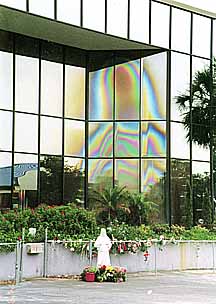 |
March 15, 2002
March 16th Holy
Spirit Novena
Scripture selection is Day 9 Period II. |
The Novena Rosary Mystery
for March 16th is Glorious. |
The 17th will be in China,
Indiana. Special help will
be needed. Try to come any
time after 1:30 PM.
We will do 6:20 prayers
before the Blessed Sacrament.
Celebrate birthdays
We are begging people to
come Monday and help
do the mailing.
March 15, 2002 After Mass
Messenger:
I just wanted to be alone with Him after communion. I wanted
intimacy with Him. I can go so deeply in an ecstatic experience
with Him. I want to be in such deep union with Him in my heart. When
I am one with Him I feel so one with the souls of the earth.
I feel one with those in the Church. I feel one with His chosen priests.
I long for the deep oneness amongst the people of the earth, as
He desires. My oneness with Him is always in that deep connection
with the Universal Church. My oneness reaches such heights in these
ecstatic experiences where I am so one with the Father, knowing
Him so intimately as His little child and loving so deeply all souls,
wanting so deeply in my soul the Father's will for all souls of
the earth.
My very deep connection is in such oneness with God, Father,
Son and Holy Spirit, I exist so deeply in God in the Mass, I want
what He wants, my prayer so deep within me is for the will
of God on this earth.
And I cannot help but constantly, incessantly tell God of my
deep, deep, burning love for Him at Mass. I am so united to God, I
know each Person so deeply and so intimately, the depth of this
union so far beyond this pen and paper. It is in knowing each
Person so intimately, in loving God more deeply every moment
of my existence here on earth that I relate so deeply with Him in
this Most Holy Sacrifice of the Mass.
My depth of union and my knowledge of the Father ever deepens
my desire for completeness with my God is the thirsting
within my soul.
My relationship with Jesus, my beloved Spouse, my Divine Bridegroom
takes on a deeper meaning every moment of my existence. My journey
into the spiritual life ever deepens. The flooding love within my
soul for God in the Mass I cannot ever explain. The Holy Spirit
fills my soul with the deepened presence of God's love.
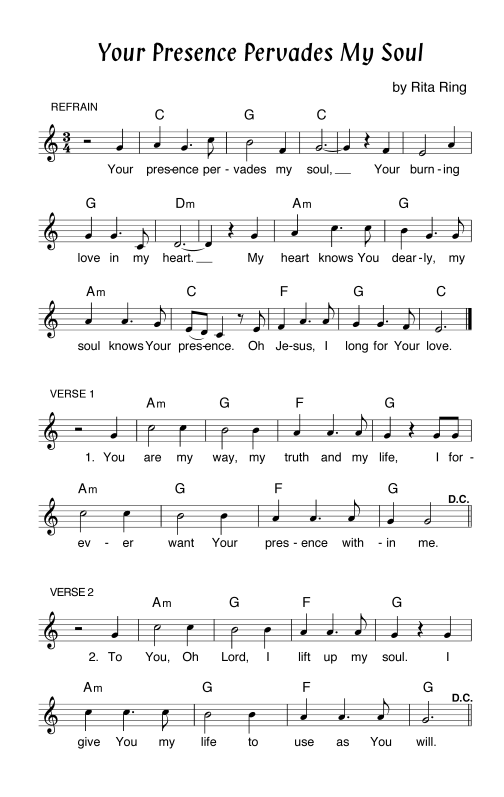
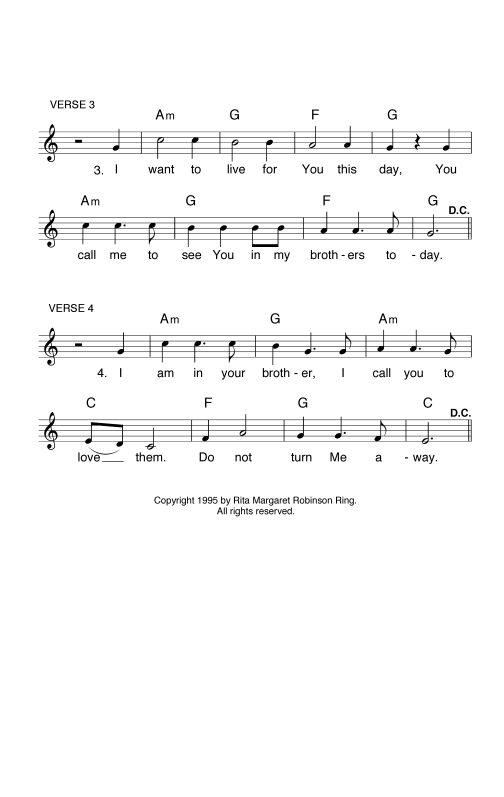
March 15, 2002 message continues
Messenger: I
am one in God. I want a deeper fullness in His divine Life.
I want completeness in Him. My heart longs for the beatific vision.
My God! I love Him so much. My deep love I cannot express.
I am taken into ecstasy in Him. My burning desire
for God in the Eucharist is so strong, I want Him, I
love Him, I want His Body and His Blood. I want this
intimacy with my God.
My soul cries for mercy for all the souls of the earth -
"Lamb of God who takes away the sins of the world
have mercy on us."
"Lamb of God who takes away the sins of the world
have mercy on us."
"Lamb of God who takes away the sins of the world
grant us peace."
At the beginning of Mass, we beg for grace to be released,
with all my heart I cry to our God.
Oh my tongue is parched and my soul longing for God.
I cry the day long for grace to be outpoured on the hungry
souls.
I feel so much depth in my heart when I communicate with Him.
I pray for the souls of the earth and our priests and our
Church and I know He hears me.
This is the promise God gave to Fr. Carter for those who pray
the Shepherds of Christ prayers.
13th Promise
Jesus speaks: "...I am calling
many to become members of Shepherds of Christ Associates. To all of them I
will give great blessings. I will use them as instruments to help bring
about the triumph of the Immaculate Heart and the reign of My Sacred Heart. I
will give great graces to the members of Shepherds of Christ Associates. I
will call them to be deeply united to My Heart and to Mary's Heart as I lead
them ever closer to My Father in the Holy Spirit."
— July 31, 1994
March 15, 2002 message continues
Messenger: To those
Churches who pray these prayers Jesus has given
so many promises.
Click on message November 4
Look at this my faithful ones.
Do you think God would give such a sign for no reason.
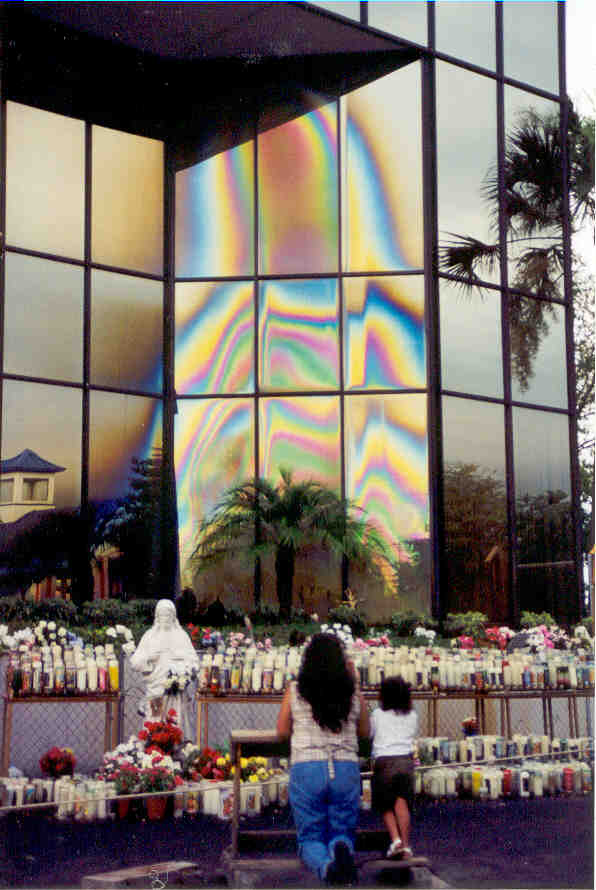
July 5, 2000
March 15, 2002 message continues
Messenger: And
He picked a priest in good standing, author of all
these books on the spiritual life to carry the
message.
It is intimacy we all crave and
God wants this intimacy with men.
This is the message.
The sickness is this: many seek intimacy, they
crave this, but they look in the wrong places.
Jesus promised Fr. Carter greater intimacy to those
who pray the prayers.
This is about this ever deeper union with the Father, Son
and Holy Spirit our souls crave.
The following writing was written by Fr. Carter in 1967-
33 years before the end of the second millennium.
This has been translated in 3 other languages early in
the seventies.
Fr. Carter was called to deliver these messages.
~ July 31, 1994 ~
Feast of St. Ignatius
Words of Jesus to Members of Shepherds of
Christ Associates:
"My beloved priest-companion, I intend
to use the priestly newsletter, Shepherds of Christ, and the
movement, Shepherds of Christ Associates, in a powerful way for the
renewal of My Church and the world.
"I will use the newsletter and the
chapters of Shepherds of Christ Associates as a powerful instrument
for spreading devotion to My Heart and My Mother's Heart.
"I am calling many to become members of Shepherds
of Christ Associates. To all of them I will give great blessings. I will
use them as instruments to help bring about the triumph of the Immaculate
Heart and the reign of My Sacred Heart. I will give great graces to the
members of Shepherds of Christ Associates. I will call them to be
deeply united to My Heart and to Mary's Heart as I lead them ever closer to
My Father in the Holy Spirit."
- Message from Jesus to Father Edward J.
Carter, S.J., Founder, as given on July 31, 1994,
feast of Saint Ignatius Loyola, Founder of the Society of Jesus (The
Jesuits)
end of July 31, 1994 message given to Fr.
Carter
~ October 13, 1994 ~
The Birth of the Full Ministries
of the Shepherds of Christ
"I wish to
share with you part of a message which Jesus gave us on October 13, 1994. The
message tells us about the expansion of the Shepherds of Christ movement:
'My beloved priest-companion, today I come to you with another mission. I am
asking you to establish Shepherds of Christ Ministries. At My request you have
already begun the priestly newsletter, "Shepherds of Christ", and
the prayer chapters, Shepherds of Christ Associates...
'I am giving you this message on this day, the 77th Anniversary of the Great
Apparition at Fatima, because of the close connection between the Shepherds of
Christ movement and the Fatima message. The Fatima message is centered in
devotion to My Heart and My Mother's Heart, especially in consecration to Our
Hearts. Shepherds of Christ Ministries is also centered in devotion to Our
Hearts. I will use Shepherds of Christ Ministries as a great instrument in
helping to bring about the triumph of the Immaculate Heart and the reign of My
Sacred Heart. When this occurs, My Church and the world will be experiencing
the great era of peace promised by My Mother at Fatima.
'Today, then, October 13, 1994, the 77th Anniversary of the Great Apparition
at Fatima, marks the birth of Shepherds of Christ Ministries. I pour forth the
great love of My Sacred Heart to all. I am Jesus, Chief Shepherd of the
flock.'
"Jesus has told us that Shepherds of
Christ Ministries includes: the priestly newsletter, Shepherds of
Christ, Shepherds of Christ Associates prayer chapters, various
publications, including books, whatever else Our Lord directs us to undertake.
"As members of Shepherds of Christ
Associates, you are an extremely important part of Shepherds of Christ
Ministries. You have given great joy to the Heart of Jesus by responding to
His invitation to become members of Shepherds of Christ Associates. As He
draws you closer to His Heart and to His Mother's Heart as Associates members,
He will fill you with an ever-increasing experience of His love, peace, and
joy."
- From In the Hearts of Jesus and Mary,
Newsletter of Shepherds of Christ Associates
by Fr. Edward J. Carter S.J., Volume 1, No. 1, 1995. p. 2.
end of October 13, 1994 message
Apostles
of the Eucharistic Heart of Jesus
My dear fellow
Associate Members,
Jesus is calling special apostles to join a new division of
the Shepherds of Christ Movement. Here is a message from Jesus given to Father
Carter:
My beloved
priest-companion, I am requesting that a new prayer movement be started under
the direction of Shepherds of Christ Ministries. I am asking for volunteers
who are willing to pray before the Blessed Sacrament for one hour,
twice-weekly. Members of the Shepherds of Christ prayer chapters, as well as
others, are to be invited to join this movement.
These
apostles are to pray for the intentions I am giving you. For part of the hour
they are to use the prayers of the Shepherds of Christ Associates Handbook.
They may spend the rest of the hour as they so choose.
I will use
this new prayer movement within My Shepherds of Christ Ministries in a
powerful way to help in the renewal of My Church and the world. I will give
great graces to those who join this movement. The name, Apostles of the
Eucharistic Heart of Jesus, is to be given to this movement.
I am
inviting My beloved Rita Ring to be coordinator for this activity.
I pour out
the great love of My Sacred Heart to all. I am Jesus, Chief Shepherd of the
flock.
This is indeed a special calling for us to unite in one heart with His
Eucharistic Heart and pray for the following intentions:
- For the spread of the devotion to the Hearts of Jesus
and Mary culminating in the reign of the Sacred Heart and the triumph of
the Immaculate Heart.
- For the Pope.
- For all bishops of the world.
- For all priests.
- For all sisters and brothers in the religious life.
- For all members of the Shepherds of Christ Movement,
and for the spread of this movement to the world.
- For all members of the Catholic Church.
- For all members of the human family.
- For all souls in purgatory.
end of Apostles of the Eucharistic Heart
message
March 15, 2002 message continues
Messenger: Why do some not practice their Catholic Faith? Why
do they go to other religions?
We must tell them about the gift of the True Presence.
Jesus gave us the Blue Book messages Fr. Carter said
the Blue Book messages were as much his as mine.
The Blue Book messages help lead the soul into a deeper
love union with God in the Eucharist.
We have the Eucharist in our Church.
The priest is a gift from God.
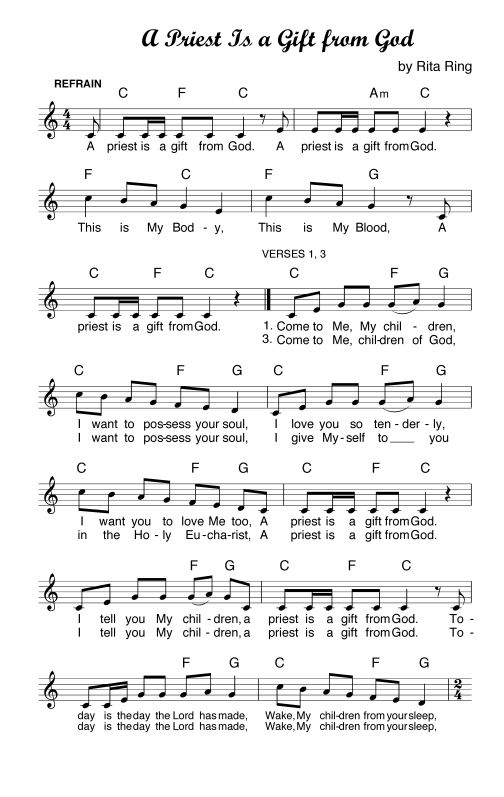
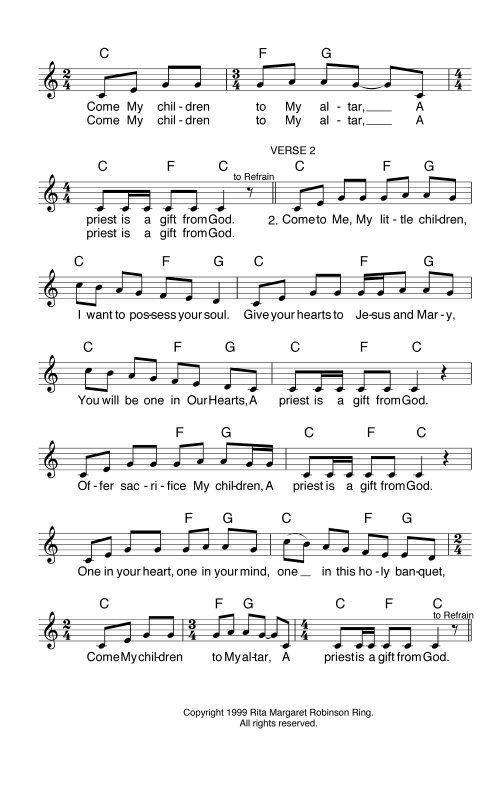
March 15, 2002 message continues
Messenger: Jesus
wants us to spread the Blue Book messages.
He is a Personal God.
He loves us so much.
He gives us Himself in the Eucharist.
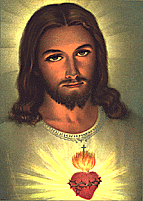 Introduction
Introduction
April
13, 1994
Words of Jesus. Read before
the Tabernacle.
Jesus speaks: How, child, do I, Jesus, tell you
I love you? You hold on to silly things when God is in your midst and is
ardently loving you. I am Jesus Christ, the Son of God. I am writing to each
precious child this day. I am on fire for love of you. I remain in the
Eucharist to be with you with My ardent love. I did not want to leave My
beloved ones at the Last Supper. I love you so, My dear and ardently loved
children. I remain with you this day in the Blessed Sacrament, the same
Jesus Who died a brutal death on the Cross.
Do you know I am truly present there? Do
you know that God waits every day for you in the tabernacle? Do you
comprehend even a minute amount of My love? You will never know of how I
love you on earth.
I, Jesus, truly the Son of God, came to
earth a man and suffered a brutal death for love of you. I love you so much!
I remain with you this day. I long for your love. I want you to come and be
with Me in front of the tabernacle. I wait, I yearn for you to come and
whisper your love to Me. I am a person and I love you this day, with such an
ardent on-fire love! No human could ever compare a speck to My love for you.
I wait, little ones, in the tabernacle. I
wait for you to come and receive Me in Communion. I want you to want Me so
much you cannot wait to come and receive Me. I want to be the love, the
center of your life!
I am Jesus. I am the Son of God. I am
writing to you this day. I want to possess your very soul and live in you. I
have all you need, sweet ones. Oh, you are so blind! I long for your union
with Me. I wrote the book of love. I instituted it, yet you go to the world
for your love and do not even come to Me! Oh, I love you, little ones.
Little ones, beloved of the Father, loved by the Holy Spirit, mothered by My
very own mother! What more can I say? The rest is up to you!
I give you your will with such love and I
want your love freely given. I am God. What do you think you could ever need
that I do not give you? I am the Savior of this world. I am Jesus, the Son
of God. I am waiting for you. I am longing for you. I am yearning for you. I
am God. I have all you ever will need!
Surrender this life to Me. Pray My Prayer
for Union with Me. I want to possess your soul and operate from your very
being. I am Jesus. I am the Son of God. I am the Sacred Heart of Jesus. I am
Who am. I died and rose on the third day.
Harken to My call, harken to My pleading.
Spend your days in love with Me. Nothing matters unless it is rooted in Me
and rooted in My love. I am the Son of God. I am the Sacred Heart of Jesus.
I love you with the tenderest love. I am waiting this day for just you, My
beloved one. Come to Me for I am the tenderest of all hearts. I am the
Sacred Heart of Jesus.
- God's Blue Book,
Volume 2 April 13, 1994
March 15, 2002 message continues
Messenger: Jesus
told me to spread that message to the far ends of the
earth to every soul, so they would know
how much He loves them.
Fr. Carter did everything he could to spread the Blue Book
messages.
Fr. Carter lived the Blue Book messages.
Fr. Carter said
"Reading the Blue Book messages, at least just a few minutes a day, can do
wonders to help us persevere in the Movement. Renew your love and commitment to
the Movement."
We must spread the Good News of Jesus Truly Present
in the Eucharist.
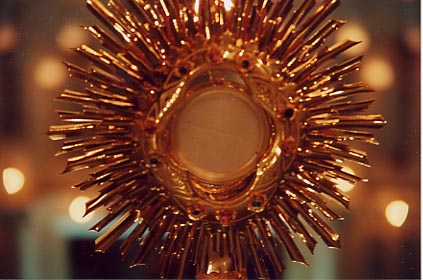

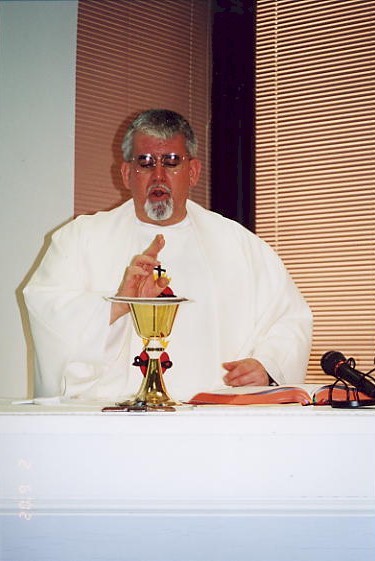
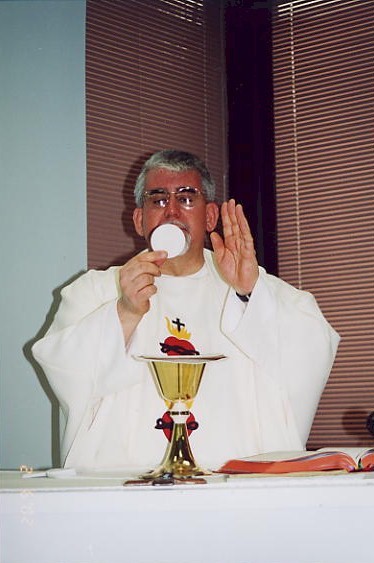
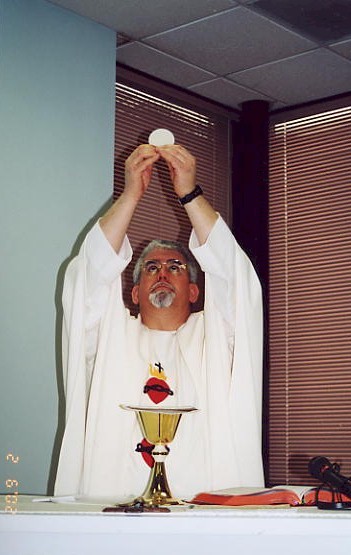
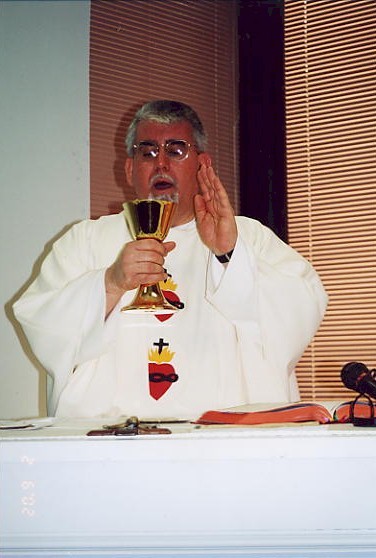
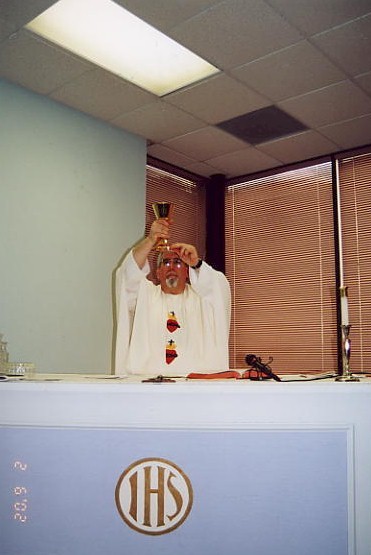
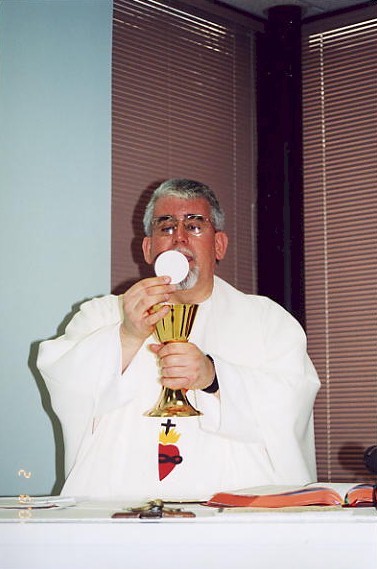
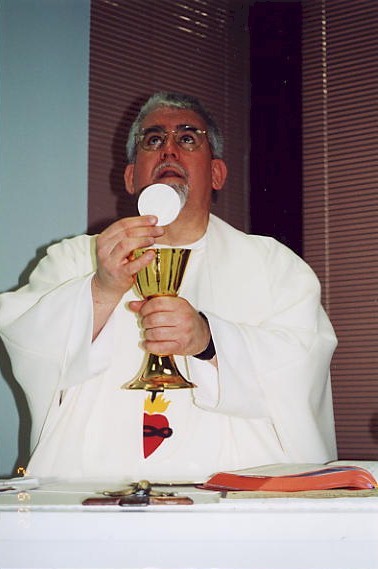
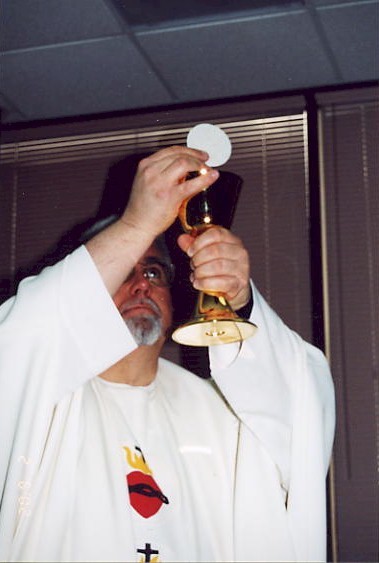
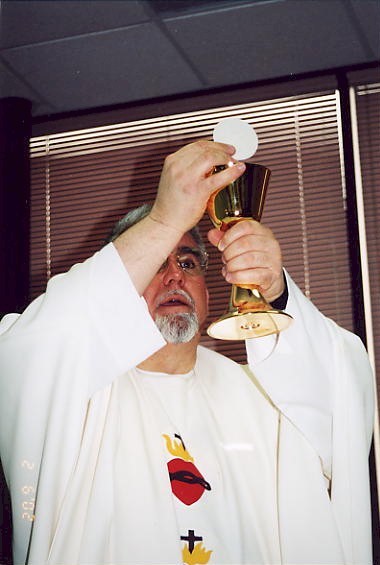

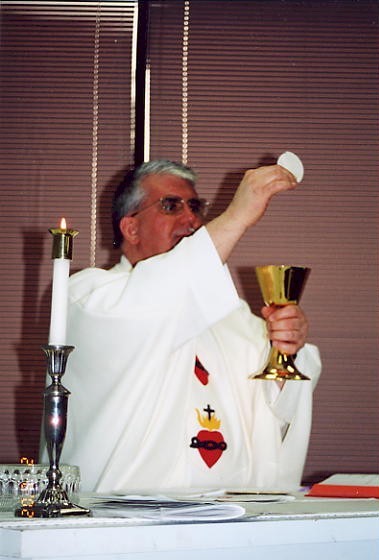
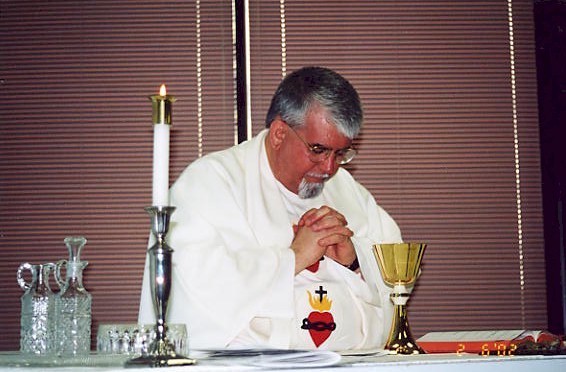
March 15, 2002 message continues
Messenger: I
love the Church so much.
The Church is so wonderful.
At Mass I have to keep letting God know how much I love
Him, I can't seem to show the love I
want to, to Him.
I love God so much.
I long for completeness in Him in heaven.
I pray from the depth of my soul at Mass for the souls
of the earth, the priests, and the Church.
Oh God help us. Here is an important message I received
May 13, 1993 anniversary of the 1st Fatima vision and
the first message in Blue Book I.

Cling to Me
 May
13, 1993
May
13, 1993
Jesus speaks: My dear child,
if you stay close to Me, then I live in you and you live in Me. I am He Who
created you and I love you with such an intensity that you will never know.
My words are your truth. You must abide in My heart in all things. There is
no room for doubt. My ways are steadfast, direct, and without error.
You must stay rooted in Me to ward off
the power of the evil one. His grip is paralyzing and crippling. His power
is stronger every day.
When you live in Me, I am in your heart
and he has no power over Me. I am your God. I am your true lover. I want to
protect you. I want to guard you from this force. Stay rooted firmly in Me
and he will have no power.
I am He Who comforts you. My hand is
upon you. Hold tight to Me, My child. My eyes are fixed right on you. You
are My most precious child. I love you as no other can. My arms are about
you. My tenderness surrounds you. My love is in your heart. You go not
alone. I walk with you.
I share every aspect of your life with
you. Cling to Me, feel My presence. It is warm and secure within your chest.
There is no room for fear, for I cast out fear and bring you comfort and
joy.
end of May 13, 1993 message
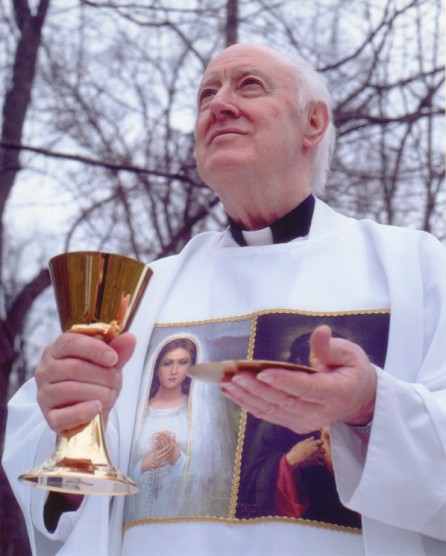
March 15, 2002 message continues
Messenger: On this disc Fr. Mike Paraniuk reads the powerful
section on grace.
(also translated in Italian, Polish, Portuguese
early in the seventies in Fr. Carter's Book
Response in Christ, but Father Carter told me
never to circulate those translations because
they hadn't gotten the Imprimatur, the
English edition of Response in Christ
received the Imprimatur in 1968.)
Excerpt from Response
in Christ - Chapter
3
The
Christian Life of Grace
In the pattern of death-resurrection,
the Church continues the prophetic, kingly and priestly offices of Christ. She
does not do this through a merely extrinsic activity, for her external action
is an incarnation of a more fundamental reality, the life of grace, the
Christ-life. Each member of the Church is called to develop this Christ-life
to the fullest. In other words, each member of the People of God is destined
for Christian holiness. Vatican II tells us this: "Thus it is evident to
everyone that all the faithful of Christ of whatever rank or status are called
to the fullness of the Christian life and to the perfection of charity. . .
."
1
If all are not called upon to live out this life of Christian
sanctity in exactly the same way, nevertheless all are called to the same
essential holiness. Vatican II states: "In the various classes and
differing duties of life, one and the same holiness is cultivated by all, who
are moved by the Spirit of God, and who obey the voice of the Father, and
worship God the Father in spirit and in truth. . . ."2
All are called to the same basic holiness because the life of
grace, which is the life of holiness, is essentially the same for all.
1. WHAT
IS GRACE?
Grace is first and foremost the lavish self-giving or
self-communication of God to man through the person Christ. This is the stress
of St. Paul. Contemporary theology therefore is correct in describing grace
first of all in terms of the special presence of the Triune God. The divine
persons are present to give us a participation in their own life, to be a
guide of our actions, and to be known and loved by us. This special presence
is variously named: the divine indwelling, the indwelling of the Trinity,
uncreated grace. "If anyone loves me he will keep my word, and my Father
will love him, and we shall come to him and make our home with him." (Jn
14:23).
Through this special presence, Father, Son and Holy Spirit unite
themselves so intimately to us in personal love that their image is left upon
us. This image of the Trinity is sanctifying grace. There are, then, two great
realities of grace: God's personal self-communication, or uncreated grace, and
created grace, or the life of sanctifying grace.
As we have just mentioned, God's gift of Himself in a special
loving presence is the aspect of grace which should be stressed. But the
reality of created grace—the life God gives us—should also receive its due
attention. Scripture so bids us. The eminent biblical scholar, John L.
McKenzie, after commenting on numerous New Testament passages, observes:
"Wide as may seem to be the range of these passages, they have in common
the conception of grace as something given, received, a reality in the
Christian and in the world in which the Christian lives."3
Also, looking at the thought of St. Paul, we have the words of
Rondet: "In First Corinthians, Paul's theology of grace takes a big step
forward. He continues to speak of grace as a special mercy, a special goodness
of God (1 Cor 1,3). But grace now also appears as a created gift, a permanent
favor. It is a kind of supernatural power, and charisms in some way embody
various aspects of it."4 Rondet
speaks further about Paul's theology of grace: "In chapter 4 of Second
Corinthians, grace appears clearly as an interior principle of spiritual life.
It is no accident that Paul goes on to talk about the interior man, the 'inner
nature which is being renewed every day' (4,16). . . ."5
Consequently, the reality of the life of sanctifying or
created grace is very clear in the New Testament.
Created grace, or the life of sanctifying grace, actually inheres
in us. On the other hand, the persons of the Trinity specially present to us
(uncreated grace), despite their mysteriously close union with us, never
become a part of our natures. Although the special presence of the divine
persons and sanctifying grace always coexist, these two realities are
nevertheless distinct.
Sanctifying grace is best described as a life. It is a sharing in
divine life. This life is one of the great themes of St. John. In the theology
of John the purpose of the Incarnation is precisely this—to reveal and
communicate divine life to men.6 "I
have come so that they may have life and have it to the full." (Jn
10:10).
God is bold and daring. Without God's revelation, who would dare
to think that God offers man a share in His own divine life? In Their
self-communication to us, and in their sharing of divine life with us, the
Trinity truly offers us a daring challenge. They bid us to live life at its
fullest, to live a life patterned after their own. Through the new powers
which grace gives us, they inexorably call us to go out of our
self-centeredness and live a life of dynamic love-relationships with
Themselves and man. Through this life of love They ask us to continue the work
of Their love, the work of creation and redemption. Through this life of love
They ask us to help change the face of the earth. Summarily, our life in
Christ is a call to the greatness of love.
To talk of grace, then, is primarily to talk of the personal
relationships in love which are established by our Christ-life. These personal
relationships we wish to stress in our treatment of grace. First of all,
however, we should briefly discuss basic ideas concerning the life of
sanctifying grace, which is the foundation for ability to enter into these
personal relationships. All things being equal, the more we know about
sanctifying grace, the better we can understand and appreciate the nature of
these personal relationships in Christ.
Although the life of sanctifying grace is a reality distinct from
our natural life, it is not something superimposed upon our nature as icing is
added to a cake. Rahner states: "The nature of a spiritual being and its
supernatural elevation are not opposed to each other like two things which lie
side by side, so that they must be either kept separate or confused. The
supernatural elevation of man is, though not due to him, the absolute
fulfillment of his being. . . ."7
Our Christ-life permeates our persons completely. Nothing which
is good is destroyed. All is elevated to a new level of existence, for through
grace we enter a new life. St. Paul affirms: "And for anyone who is in
Christ, there is a new creation; the old creation has gone, and now the new
one is here." (2 Co 5:17)
Why are we able to live on a new level of existence through
grace? The answer lies in the fact that we receive a created sharing in the
divine nature. Nature, we know, is a principle or capacity of operation
according to a certain level of existence. An angel can perform acts of an
angel because he has an angelic nature. A man can know intellectually because
he has a rational nature. Likewise, through our Christ-life of grace we can
perform God-like acts because we have received a new nature. Scripture speaks
to us about our participation in the nature of God. In one of the most noted
passages of the New Testament on the life of grace, we read: "By His
divine power, he has given us all the things we need for life and for true
devotion, bringing us to know God himself, who has called us by his own glory
and goodness. In making these gifts, he has given us the guarantee of
something very great and wonderful to come: through them you will be able to
share the divine nature and to escape corruption in a world that is sunk in
vice." (2 P 1:3-4).
It is not sufficient that we possess this Christ-life, this new
vital principle. Also we need the supernatural faculties through which this
Christ-life can both express itself and grow. This is evident if we consider
our natural life as an analogy. It is not sufficient to possess a human
nature. The life of this nature has to express itself and grow through various
sense and spiritual faculties. For instance, one expresses his life as a man
when he uses his intellect or when he walks.
What are the supernatural faculties through which my Christ-life
expresses itself and grows? These faculties are the supernaturally infused
virtues, chief of which are faith, hope and love. These virtues give the
Christian the capacity to channel his Christ-life into the various areas of
his total existence. Or to put it in a slightly different manner, we can say
that these virtues allow the Christian to relate properly to God, man and the
rest of creation. They are positive modifications of the person, allowing him
to act with various Christian attitudes. The virtues, in turn, are activated
by actual grace which affects both our intellects and our wills.
God has given the Christian still another gift of grace. We refer
here to the gifts of the Holy Spirit. These gifts are capacities which allow
the Christian in a special manner to be receptive to the inspirations of the
Holy Spirit. These gifts, in turn, have as their purpose the perfecting of the
infused virtues. Theologians teach that the virtues do not achieve a mature
stage of development without the simultaneous activity of the gifts.
Another important aspect of grace is that which is termed
external. External actual grace is a person, place or thing which serves as an
occasion for internal grace. We must realize the extreme importance of
external grace, especially concerning persons. There are many examples. A wife
can receive God's grace through the loving presence of her husband. The
witness of a dedicated Christian can inspire us to greater things. The love
and encouragement of a friend can spur us to a more generous self-giving in
the work of Christ. Yes, persons are extremely important in God's plan.
How does our Christ-life grow? This growth centers around the
themes of love. Our Christ-life grows as we open ourselves up to God's love in
the sacraments, especially the eucharist. We grow in Christ through the love
of God and man which is expressed in various types of meritorious actions
performed in the state of grace. We grow in Christ when God in His love
graciously answers our prayers through which we have petitioned Him to take
deeper possession of us through, for instance, an increase of faith, hope and
love. In summary, we grow in our Christ-life through the various dimensions of
loving relationships with God and others. Love is all important. The other
virtues are important to the degree that they are influenced by love and serve
love.
2. THE GRACED CHRISTIAN
AND VARIOUS RELATIONSHIPS
Our life of grace establishes various relationships between
the Christian, God and the rest of creation. The first to be considered is
that between the Christian and the persons of the Trinity.
We should first give brief attention to certain theological
principles and truths which have a relevance to any discussion involving our
relationship to the three divine persons. One of these theological principles
is that of appropriation. This is a mode of predication by which the
properties and activities common to the three divine persons are especially
attributed to one of the persons because of a property peculiar to this
particular person. For instance, because of His fatherhood, we refer to God
the Father as our Creator, although all three persons equally create.
Therefore, we really have no proper relationship to the Father as our Creator,
but only one based on appropriation. The process of our sanctification is also
an action common to all three persons. But because it is a work of God's love
for us, and since the Holy Spirit is the love existing between Father and Son,
we appropriate sanctification to the Holy Spirit.
This principle of appropriation preserves the traditional
Catholic teaching that all divine activities ad extra (outside of God)
are common to the three persons. At the same time it manifests the differences
between the divine persons and properties.
Yet many contemporary theologians are not satisfied in appealing
only to the principle of appropriation as they strive to explain the
relationship between the Christian and each of the divine persons. They
maintain that scripture does not always seem to speak in an appropriated sense
in describing our union with the Father, Son and Holy Spirit. Consequently,
while adhering to the above principle concerning God's activity outside
Himself, contemporary theologians are discussing the question of proper
relationships between ourselves and each person of the Trinity. They do this
by appealing to other than efficient causality. For instance, certain
theologians, such as Karl Rahner, appeal to a quasi-formal type of causality
in explaining the theology of the indwelling of the Trinity in the justified
man.
8 Such an
explanation, not based on the principle of appropriation, allows for a proper
and more personal relation between the justified man and the three distinct
persons.
Let us also note that in speaking of the Christian's union with
Christ as man, there is the question of a proper and special relationship.
This is true because among the divine persons only the Son possesses a human
nature.
We have constructed our framework of reference for discussing the
role of Father, Son and Holy Spirit in our lives. Having once established it,
we are consequently relieved of the burden of describing in each instance the
type of relationship we are discussing, whether it is based on appropriation
or not.
a) Relationship with
the Father
The Heavenly
Father has put each of us upon this earth because of His singular love for us
as individuals. There is a countless number of merely possible human persons
existing in the divine knowledge. Why has the Father given existence to me
rather than to these "possibles" who will never exist? The ultimate
answer lies in the mysterious free will of the Father. He has chosen to love
me, to give me existence, to give me a grace-life.
In His love for me the Father has entrusted me with a great
purpose. I have a loving service to give to God, to the Church, and to the
world—a service which no one else can render. Each of us has been put here
to fulfill a mission, to use our lives, not only for ourselves, but to labor
through these lives for the glory of the Father and the benefit of men.
We tend to underestimate the value of our lives. Perhaps this is
so because our faith is not what it should be. We would be astounded if we
could see the potential of our lives as does our heavenly Father. We are
great, not because of what we are in ourselves, but because of what our Father
has already done for us, and because of what He wants to do for us—if only
we allow Him.
Perhaps we would not be constantly tempted to underestimate the
worth of our lives if we more often reflected upon some of the great examples
of what God can accomplish through the life of one person. There has
been a St. Augustine, a St. Dominic, a St. Francis of Assisi, a St. Thomas
Aquinas, a St. Elizabeth, a St. Ignatius Loyola, a St. Thomas More, a St. John
Vianney and many others. In and through their various vocations they have
contributed profoundly to the work of Christ. Coming closer to our own day we
have the example of Pope John XXIII and Dr. Thomas Dooley. These two lives,
have they not left an indelible imprint upon the world of men? Can one
life make a great difference to Church and world? The answer is obvious.
And yet, you might object, the examples just cited are lives of
outstanding men and women. After all, how many are destined to walk across the
stage of life in such dominant display before the eyes of men? We acknowledge,
not very many. But there could well be numberless lives, almost completely
hidden to the world, which have also contributed greatly to the cause of
Christ. Perhaps, even, these hidden lives have at times given more to Christ
and the world than have the lives of the canonized saints. God's ways are not
always our ways, nor are His thoughts always our thoughts. Our heavenly Father
can make use of the most obscure and insignificant life to accomplish great
things.
Each Christian must strive to grow in the realization that the
Father calls him to greatness. He accomplishes this purpose by the gradual
development of his Christ-life. Whatever our particular purpose or mission in
life may be, it will be authentically accomplished in proportion to the
development of our grace-life in Christ. For our destiny in Christ includes
all else. Our life of grace, in turn, develops around the all-embracive theme
of the Father's will. The Father's will for me is what gives unity to my life.
If I embrace this will, it holds together all the multitudinous threads of my
existence, weaving them into a meaningful pattern—the achievement of my
life's purpose.
Consequently, to grow in Christian holiness and to achieve my
mission in life are supremely possible for me. Why? Because growth in the
realization of my life's task is always commensurate with my Father's will for
me here and now. His will for me is always proportionate to my present
weakness on the one hand, and, on the other, to my present degree of spiritual
maturity. Finally, His will for me always carries with it the necessary graces
for accomplishing what He here and now asks.
As I reach out for my Father's will in love day after day, I am
thereby dynamically developing my Christ-life, achieving my destiny, making my
very important contribution to the evolving redemptive work of Christ.
The Father's will touches everything in my life. It wants to make
all contribute to my growing maturity in Christ. Joy and sorrow, success and
failure, work and play, ecstatic happiness and deep suffering, all of these
are to be related to my Father's will. If I correspond to God's grace, His
will as it permeates my total being and existence will unfailingly transform
me.
As the Father's will transforms me, it thereby makes my life a
success for myself and others. The only true measure of a successful life,
despite possible appearances to the contrary, is whether or not it is
conformed in love to the Father's will. The degree of success depends upon the
degree of conformity. " 'It is not those who say to me, "Lord,
Lord", who will enter the kingdom of heaven, but the person who does the
will of my Father in heaven. When the day comes many will say to me,
"Lord, Lord, did we not prophesy in your name, cast out demons in your
name, work many miracles in your name?" Then I shall tell them to their
faces: I have never known you; away from me, you evil men!' " (Mt
7:21-23).
The above described Christian life is certainly impossible
without God's grace. We must be deeply aware that grace is a gratuitous gift
which we cannot achieve by our natural efforts. But God offers grace in
abundance. Our problem is that we do not respond to grace as we should. We
tend to minimize the Father's great designs for us. We are tempted not to take
His words at face value, those which tell us of the fathomless love He has for
each one of us, and what that love can accomplish in us. To help ourselves
maintain the proper perspective in these matters, we should often remind
ourselves of these words of St. Paul: "We were still helpless when at his
appointed moment Christ died for sinful men. It is not easy to die even for a
good man— though of course for someone really worthy, a man might be
prepared to die—but what proves that God loves us is that Christ died for us
while we were still sinners. Having died to make us righteous, is it likely he
would now fail to save us from God's anger?" (Rm 5:6-9).
We have, therefore, an irrevocable and overwhelming testimony of
the Father's love for us. Because of this love, the Christian can increasingly
assimilate the Father's will in his own response of love. Through this mutual
self-giving, God and the Christian are meant to be united in the deepest
possible love.
The above passage from St. Paul not only tells us of the Father's
great love for us, but it also tells us that this love has come to us through
Christ and continues to do so. There is no other way. This is the eternal
design of the Father. Our grace-life as well as all creation takes its meaning
from Christ: "He has let us know the mystery of his purpose, the hidden
plan he so kindly made in Christ from the beginning to act upon when the times
had run their course to the end: that he would bring everything together under
Christ, as head, everything in the heavens and everything on earth." (Ep
1:9-10).
b)
Relationship with Christ
Scripture, then, indicates the necessity
of seeing our grace-life in its relationship with Christ. It is rather amazing
that dogmatic theology in its treatment of grace has traditionally said so
little about Christ. With a bit of sarcasm, Rahner says: "The tractate de
Gratia is commonly entitled de Gratia Christi. Commonly it contains
little else about Christ. And yet we only have a Christian understanding of
grace when it is conceived of not only in the most metaphysical way possible,
as a divinization, but rather as assimilation to Christ. And the existential
transposition of this is the following of Christ. . . ."9
How is this assimilation to Christ which Rahner speaks of
initiated? Our life in Christ begins in a formal, ecclesial manner with
baptism of water—notice, we are not saying that the grace of Christ cannot
be had without baptism of water. As baptism marks us as members of the Church,
it also indelibly imprints upon us the image of Christ.
The life of the Christian, consequently, is a development of the
image of the Incarnate Word given in baptism. The Christian, as he grows in
grace, is being shaped more and more after this image of Christ: "We know
that by turning everything to their good God co-operates with all those who
love him, with all those that he has called according to his purpose. They are
the ones he chose specially long ago and intended to become true images of his
Son, so that his Son might be the eldest of many brothers." (Rm 8:28-29).
The Christian requires motivation if he is to allow this
Christ-likeness to permeate his existence more and more. The Christian must
strive to catch a glimpse of that burning vision of St. Paul. For Paul, Christ
was the fiery center of an intense existence: "Life to me, of course, is
Christ, but then death would bring me something more; but then again, if
living in this body means doing work which is having good results—I do not
know what I should choose. I am caught in this dilemma: I want to be gone and
be with Christ, which would be very much the better, but for me to stay alive
in this body is a more urgent need for your sake." (Ph 1:21-24).
Each Christian, according to the graces God gives him, can model
his life after the example of Paul. Each of us also can make Christ the
dynamic center of our existence. If we dare to live in this way, Christ will
fulfill us; for in Christ we possess everything else. In Him we are deeply
related in love to God, man and the whole of creation. To develop as fully as
possible the image of Christ implanted through baptism is to exercise the only
fully true life. So has the Father willed it.
You will remember that we also spoke of the persons of the
Trinity imprinting their image upon us as they communicate the life of
sanctifying grace. What is the connection between the image of Christ and the
image of the Trinity, both imprinted upon the Christian? The connection
between the two lies in the fact that the life of grace, the image of the
Trinity, comes to us through Christ and is to be lived according to the
pattern established by Christ. Our life of grace is indeed a share in
Trinitarian life. But we must live out this Trinitarian life according to the
basic manner in which Christ lived out the grace-life in His own human nature.
Here we emphasize the fact that Christ as man possessed His own life of
sanctifying grace.
Why must our life of grace be modeled on Christ's grace-life? We
cannot give others sanctifying grace. But the man Christ, head of the human
race, does give men a share in the life of sanctifying grace which He
possesses within His human nature. Theologians call this grace to be given to
His members the grace of Christ the Head. Our life of grace, consequently,
since it is the grace of Christ, has been structured according to the
modalities or characteristics implanted by Christ. Christ established this
structure as He exercised His own life of grace in His human, historical
existence. While not claiming to be exhaustive, we will now examine various
characteristics of Christ's life of sanctifying grace. Through such a
procedure we thereby understand various characteristics and thrusts of our own
life of grace.
First of all, Christ's life of grace was filial. The dynamism of
this particular modality always led Christ to a perfect, loving service of His
Father. His Father's will was all in all to Him. It was the guiding principle
of everything He did, of everything He thought, of everything He spoke. Zeal
for His Father's glory consumed Him. He would not rest until the work of the
Father which he had been sent to accomplish was fulfilled in every detail. To
love the Father's will was Christ's attitude towards life. He would cling to
this principle even at the expense of a death of excruciating agony in body
and soul. The words which Christ uttered in Gethsemane perfectly sum up His
existence as man: " 'My Father,' he said 'if this cup cannot pass by
without my drinking it, your will be done!' " (Mt 26:42).
Christ's life of grace was also salvific. His life always had
that very obvious dimension of being orientated in love to man's good. All of
Christ's life as man, swelling up from the unfathomable depths of the most
intense love, was redemptive. Everything He did was gradually accomplishing a
change in man's stance before the Father. He was bringing man from a state of
enmity to a state of friendship and sonship with the Father. Christ's life,
then, was magnificently selfless. Guided by love of His Father's will, He gave
Himself completely to men. He gave until there was nothing more to give. This
is the poignant beauty of Christ's life.
Christ's grace-life was also social, communal and ecclesial. His
redemptive work was directed towards drawing all men together in a deep bond
of love as brothers of a common Father. The establishment of His Church would
perennially guarantee that there would be a visible source of grace for a
growing sense of community among men. At the same time, this Church, the
People of God, is intended to give a visible example of how the Lord desires
men to be united in mutual bonds of love.
Christ's life of grace tended toward an epiphany. That is, it
tended toward sacramentality, toward a manifestation of divine realities in
space and time. Christ's grace-life, working through His sacred humanity, used
the ordinary events and conditions of human existence and the created things
of man's world to reveal the Father and the Father's plan for men.
Christ's life of sanctifying grace was also transfigurative.
Christ did not come to suppress, but to elevate. He came to transform—to
transfigure—man and his world. Anyone who considers Christianity to be a
negative religion does not really understand the work of Christ.
These are some of the chief modalities or dimensions of Christ's
life of grace. These modalities, in turn, were concretely expressed through
the various mysteries or events of Christ's human life. Central to these
mysteries were His death and Resurrection. We will discuss these mysteries of
Christ at greater length in the chapter devoted to the liturgy. For it is
within the eucharistic liturgy that we encounter the mysteries of Christ in a
very special manner.
At this point we again remind the reader of the connection
between Christ's life of sanctifying grace and our own. Rahner puts it very
succinctly: "And yet every grace has analogously the same structure as
its source, viz. the structure of the Word become man. . . ." l0
Consequently, as Christ's life of grace was filial, salvific,
social, communal and ecclesial, so must be ours. As Christ's grace-life was
sacramental (tending toward manifestation) and transfigurative, so likewise
must be ours. Finally, let us remember that the Christian expresses these
various dimensions of grace as he relives the mysteries of Christ, especially
those of death-resurrection.
We have briefly considered the relationship between the
graced-Christian and Christ. As this relationship grows in mutual love, the
Christian understands with maturing penetration what it means to be
incorporated into Christ Jesus. He becomes more aware of the full implications
of St. Paul's words: "I have been crucified with Christ, and I live now
not with my own life but with the life of Christ who lives in me." (Ga
2:19).
c)
Relationship with the Holy Spirit
After the glorified Christ was
established in power and glory with the Father, He sent the Holy Spirit to
sanctify the world. The task of the Holy Spirit is to imprint the mystery of
Christ ever more deeply upon the whole of creation. The Holy Spirit gradually
is leading man and his universe to a greater Christo-finalization. This
Christo-finalization will reach its completion at the time of Christ's second
coming. Then creation will receive its final transformation. Then the movement
of creation to the Father, in Christ, by the Holy Spirit will be complete.
As this process evolves, the Holy Spirit concentrates His action
upon the Church of Christ; for this evolutionary movement of creation in
Christ has as its dynamic center the evolution of the Church. The Church
progressively evolves by assimilating more perfectly the mystery of Christ.
The Holy Spirit guides this process. He is the soul of the Church because He
constantly labors to unite the diversified elements of the Church into a more
perfect image of Christ.
The Holy Spirit as sanctifier not only guides the entire Church,
but He also guides each member of the Church. Here again His task is basically
the same. He strives to deepen the image of Christ which has been indelibly
imprinted upon the Christian. He labors to Christo-finalize more radically all
areas of the Christian's existence. In this regard we notice the biblical
distinction of living according to the Spirit rather than according to the
flesh. To live according to the flesh does not refer only to sins against
chastity. It refers to anything in my life which is not according to the
Spirit. Therefore, intellectual pride, something very "spiritual,"
would be living according to the flesh in the biblical sense.
On the other hand, to live according to the Spirit can include
the most intense involvement with material creation or use of the senses. All
of this can be profoundly Christian as long as we are following the lead of
the Holy Spirit. In this context we again emphasize that everything
about the Christian has been elevated by grace, not merely his spiritual
nature.
To live fully according to the Spirit demands a growing
realization of the manner in which the Holy Spirit leads the Christian to a
greater Christ-likeness. This involves discernment of spirits. This concept
will be developed at some length in a later chapter.
In summary, the Holy Spirit promotes the process of our becoming
sons in the Son. The Christian's response to the Spirit measures his degree of
incorporation into the adoptive sonship of the Christ-life. "Everyone
moved by the Spirit is a son of God. The spirit you received is not the spirit
of slaves bringing fear into your lives again; it is the spirit of sons, and
it makes us cry out, 'Abba, Father!' " (Rm 8:14-15).
d) Relationship
with Mary
Karl Rahner tells us that devotion to
Mary is one of the great signs of final perseverance.11
By such a statement Rahner emphasizes for us the great role
Mary exercises in the life of the Christian. Really, the emphasis of Rahner is
merely a continuation of the great importance attributed to Mary by the
Fathers, doctors, and saints of the Church throughout the ages.
Mary assumes such a concrete importance in the life of each of us
because she is the mother of the Church and the mother of each Christian. She
is a mother to all men, but in a special way to the Christian.12
Mary's spiritual motherhood toward us had its beginnings at
the time of the Incarnation. As Mary conceived Christ in a physical manner,
she at the same time conceived us in a spiritual manner. In her holy womb she
bore both Christ, the Head, and us, His members.
The second great stage in Mary's maternal relationship toward us
was accomplished upon Calvary. There, in extreme spiritual suffering, she
offered Christ to the Father. From the pierced side of Christ the Church was
born. Mary, in the extreme anguish of spiritual childbirth, brought us forth
to supernatural life. "Seeing his mother and the disciple he loved
standing near her, Jesus said to his mother, 'Woman, this is your son'. Then
to the disciple he said, 'This is your mother.' " (Jn 19:26).
The third and final phase of Mary's spiritual motherhood is a
continuing process. Under God, she gives us our life of grace. In her maternal
love she protects and nourishes this life. She intercedes for all the graces
necessary for its proper growth. As Mary cooperated with the Holy Spirit in
first giving Christ to men, so she continues the same cooperation in regard to
each Christian. Through the life of grace Christ is meant to take deeper and
deeper possession of each one of us. Mary and the Holy Spirit continually
labor to achieve this. Mary's only desire for us is that we grow more and more
into the full stature of Christ. Her overwhelming love for us is evident. We
manifest our love for her by committing ourselves to her maternal love and
care so that she can achieve her desired purpose. That purpose, again, is to
form Christ in us.
e) Relationship
with Members of the Church
There is but one true
Church of Christ. Yet this one Church has three different states of existence.
There is the pilgrim Church, the Church of this world, composed of members who
have received the grace of Christ and strive for its development. They have
not yet obtained the goal of their efforts, as have the members of the
heavenly Church, who enjoy God in eternal happiness. The Church suffering is
an intermediate state of existence necessary for those who had not achieved
the required purification as members of the pilgrim Church. Although there are
these three phases of the Church's existence, there is a profound union
existing between all the members. All these members possess the same basic
life of grace in Christ, and this common life establishes the most intimate
bonds of love. In our preceding chapter, we discussed the pilgrim Church. Let
us now consider the Church suffering and the heavenly Church.
The members of the Church suffering are those who have departed
from this life in an incomplete state of Christian development. Their
development is incomplete in the sense that grace has not fully taken
possession of them, and, as a result, they are yet closed in upon themselves
to a greater or lesser degree. They as yet cannot open themselves out in
complete love to the Triune God in the beatific vision. They must undergo a
further purification, a purification which could have been achieved upon earth
with merit. Now the purification must be achieved with no merit attached. The
pain of this purification is mixed with the certain expectation of achieving
the vision of God. We can hasten the advent of this vision for this people by
the offering of prayers and other good works. Scripture itself refers to our
action on behalf of those in purgatory in Chapter 12 of the Second Book of
Maccabees beginning with verse 38.
The members of the heavenly Church are those in whom the life of
grace has taken full possession and has reached its completion in the life of
glory. Faith now is unnecessary, as the light of glory gives the human
intellect a new strength and capacity for seeing God face-to-face. While the
Christian was a wayfarer, he received the imprint of the indwelling Trinity as
he shared in God's own life. Now in heaven that grace-life and possession of
God reaches its completion—the absolute completion is not achieved, however,
until the resurrection of the body. The divine persons give Themselves to the
beatified in a profound union far surpassing that of the indwelling of the
Trinity experienced here below.
This life of heaven is still the Christ-life, for just as we
possess a share in Trinitarian life here below as mediated by Christ, and
exercise this grace-life as structured by Him, so also in heaven is the
mediation of Christ present. In the words of Rahner, "One always sees the
Father through Jesus. Just as immediately as this, for the directness of the
vision of God is not a denial of the mediatorship of Christ as man."13
And not only does the humanity of Christ unite the blessed to God, but also,
in some way, to the whole of creation. This is merely a completion of what is
begun here below, namely, the union with Christ in His humanity establishing
the Christian in a special relationship with God, with other men, and with the
whole of creation. We have a glimpse, therefore, of the fullness of life which
members of the heavenly Church possess.
The heavenly Church, as St. Thomas says, is the true Church.14
The Church of this earth and the Church of purgatory are, each
in its own way, reaching out in loving hope for the heavenly Jerusalem.
Vatican II puts it very simply: "The Church, to which we are called in
Christ Jesus, and in which we acquire sanctity through the grace of God, will
attain her full perfection only in the glory of heaven."15
The members of the heavenly Church can help us in living our life
of grace until we too share its fullness with them. Their power of
intercession on our behalf is but another ramification of the communal aspect
of Christianity. We are meant to help others grow in Christ. We, in turn, are
intended by God to receive aid from others—yes, from members of the heavenly
Church, as well as from those with whom we dwell here below.
Not only can we be aided by the saints' intercession, but the
example of the canonized saints can also be of great value to us. They have
concretely proved that full holiness is possible. Such an inspiration
is of real worth when we are tempted to think that Christian sanctity in its
higher degrees is impossible of attainment. Moreover, the canonized saints, in
their diversity, teach us that there are many authentic versions of Christian
holiness. They can be innovators in showing us that there are numerous
possibilities in assimilating the mystery of Christ, although the basic
assimilation remains the same for all Christians of all times. In the opinion
of Rahner this is one of the chief roles the canonized saints exert in the
life of the Church.16
f) Relationship
with Man and His World
The Christian's
Christ-life also establishes a special relationship between himself and all
other men and the world in which both are situated. This is so because of the
basic nature of grace—the fact that it is a share in God's life. The object
of life in God is not only Himself, but also His creation. The Christian,
through his life of grace, shares in this double dimension of God's life. Just
as God not only loves Himself, but also His creation, so also must the
Christian love both God and His creation. The Christian is called in a special
way to further the creative and redemptive work of God.
This aspect of the Christian's grace-life is also mediated by
Christ. Christ, through His human enfleshment, has immersed Himself into man's
world. Through His humanity he unites all men and all authentic human and
temporal values to Himself. Through His redemptive love Christ has elevated
the Father's creation to a new level of existence. Christ has initiated a
process of gathering up all of creation for the glory of His Father. This
process will reach its completion at the parousia. Meanwhile the Christian
labors with Christ to further this evolutionary process of creation and
redemption. Consequently, in faith, hope and love, the Christian assumes a new
responsibility and privilege toward man and his world.
He must take this privilege and responsibility seriously. Men of
our era such as Bonhoeffer and Teilhard de Chardin have strikingly placed this
responsibility before Christianity. Christianity has to show the contemporary
world that it is profoundly interested in all its authentic values and
aspirations. Christianity must further demonstrate that the principles of
Christ are the only ones which can guarantee the true progress of man's world.
The world belongs to Christ and it is impossible for it to develop
authentically outside of Christ.
We have traversed a rather wide area in this chapter dealing with
the life of Christian grace. Grace, in its inner reality, and in its various
relationships and ramifications, is complex to a certain extent. But
ultimately it has a profound simplicity and unity. Christ is the one who
gathers up and unifies. He is the one who makes grace tangible, concrete and
personal to the Christian. Radically, the life of grace is life in God as
mediated by Christ. "We can be sure that we are in God only when the one
who claims to be living in him is living the same kind of life as Christ
lived." (1 Jn 2:5-6).
_______
1Constitution on the Church, No.
40.
2Ibid., No. 41.
3John L. McKenzie, Dictionary of the Bible
(Milwaukee: Bruce, 1965), p. 325.
4H. Rondet, The Grace of Christ (Westminster,
Maryland: Newman, 1966), p. 37.
5Ibid.,
p. 39.
6Cf. E. Fortman, The Theology of Man and Grace:
Commentary (Milwaukee: Bruce, 1966), pp. 34-53.
7Karl Rahner, Theological Investigations, Vol.
IV (Baltimore: Helicon, 1966), p. 183.
8Cf.
Karl Rahner, Theological Investigations, Vol. 1 (Baltimore: Helicon,
1965), pp. 319-346.
9Ibid., p. 199.
10Karl Rahner, Theological
Investigations, Vol. II (Baltimore: Helicon, 1960), p. 33.
11Cf. Karl Rahner, Spiritual Exercises (New
York: Herder & Herder, 1965), p. 283.
12Cf. Edward Schillebeeckx, Mary, Mother of the
Redemption (New York: Sheed & Ward, 1964), p. 128.
13Karl Rahner, Theological Investigations, Vol.
III (Baltimore: Helicon, 1967), p. 44.
14Cf. St. Thomas Aquinas, In Ad Ephes., c. 3,
Lect. 3.
15Second Vatican Council, Constitution on the
Church, No. 48.
16Cf. Karl Rahner, Op. cit., pp. 100-101.
end of excerpt from Response in Christ
March 15, 2002 message continues
Messenger: In
the Shepherds of Christ Movement we are doing much
of what Mary asked for at Fatima.
Mary said Bishops need to consecrate their
dioceses to her Heart and the Heart of her
Son Jesus.
We are spreading the rosary meditations.
Here is the message Mary gave October 13, 1917 at
Fatima - we must pray the rosary.
Excerpt from the Spirituality of Fatima
by Father Edward Carter, S.J.
October 13, 1917
In her message that day, Our Blessed Mother told the children:
I am the Lady of the Rosary. I
have come to warn the faithful to amend their lives and to ask pardon for
their sins. They must not offend Our Lord any more, for He is already too
grievously offended by the sins of men. People must say the Rosary. Let
them continue saying it every day.(17)
NOTE:
17. For background material on Fatima, I am particularly
indebted to
Our Lady of Fatima's Peace Plan from Heaven (Rockford:
TAN
Books and Publishers, Inc., 1983). p.7.
end of excerpts from The Spirituality of Fatima
March 15, 2002 message continues
Messenger: Here is the book we circulate to the Catholic Schools
in the U.S. which talks about Fatima, the
rosary meditations and the Real Presence.
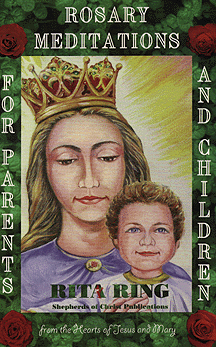
March 15, 2002 message continues
Messenger: The
rosary aves - a single sheet has been
translated in French, Spanish and
Portuguese with the Imprimatur.
Here is an example of the coloring books for
little children to pray the rosary.

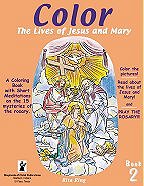
March 15, 2002 message continues
Messenger: Also found in the Little People's
Rosary book.
This was very carefully discerned by Fr. Carter
and also translated in Spanish.
The Coloring Books and Little People and Elderly book
do not have the Imprimatur.

March 15, 2002 message continues
Messenger: Think
of how English speaking and Spanish speaking
children could learn about the rosary as Mary
desires.
Mary said at Fatima, we must pray the rosary.
We must reach the little children.
Mary appeared to me everyday for 14 months
before she appeared on the building
in Clearwater.
She appeared in an old seminary.
A good number of the priests in Cincinnati
went through that seminary.
Before Mary appeared there
one of 2 wings of the old seminary
fell off.
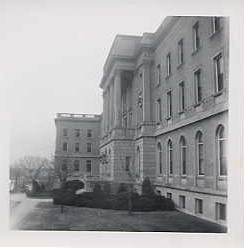
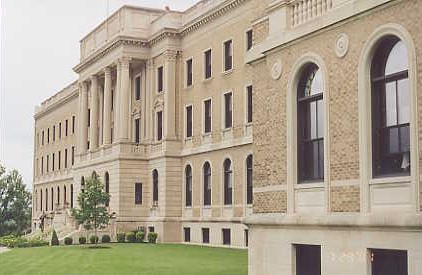
March 15, 2002 message continues
Messenger: It
fell off in minutes on Lucia's birthday
March 22, 1994.
Mary then began appearing to me July 5, 1994.
She appeared five months in the opposite
wing, crying out to reach the school
children with the rosary.
We put all these messages in a book Rosaries
from the Hearts of Jesus and Mary,

March 15, 2002 message continues
Messenger: The same day it left the publisher with the
rainbow on it December 17, 1996, Mary
appeared on the building in Clearwater.
She has been there on the building ever since.
Here is how Mary appeared March 5, 2002
while we did the Shepherds of Christ Prayers.
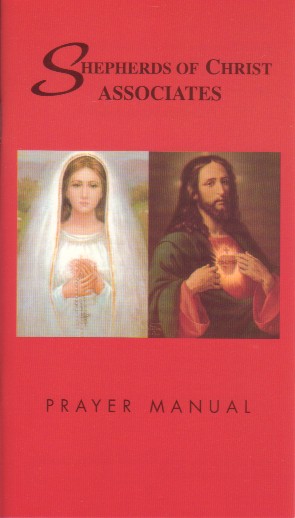
Pictures from March 5, 2002


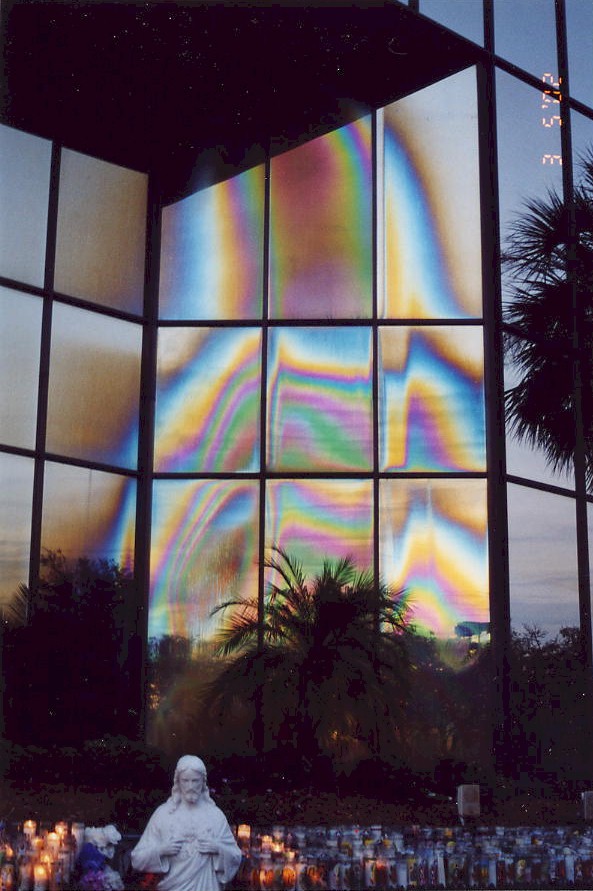

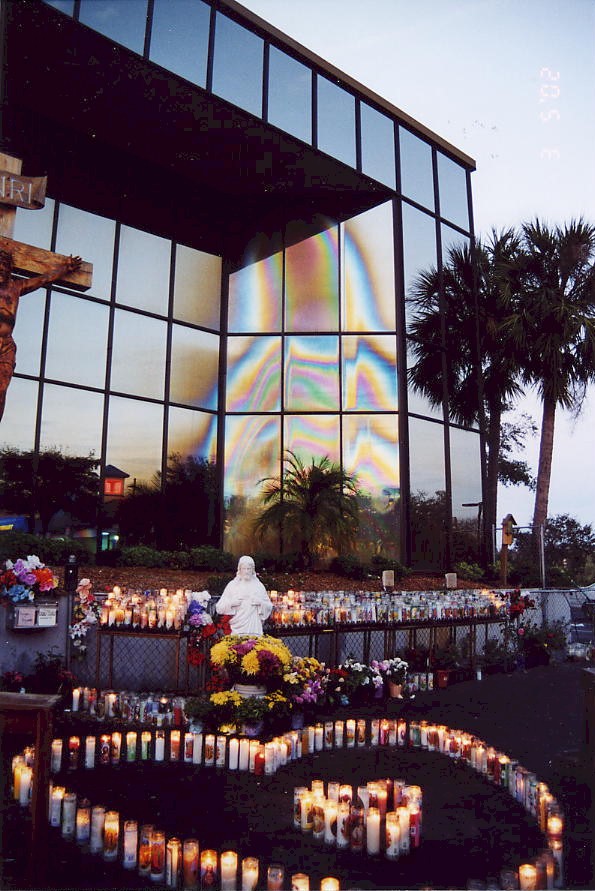
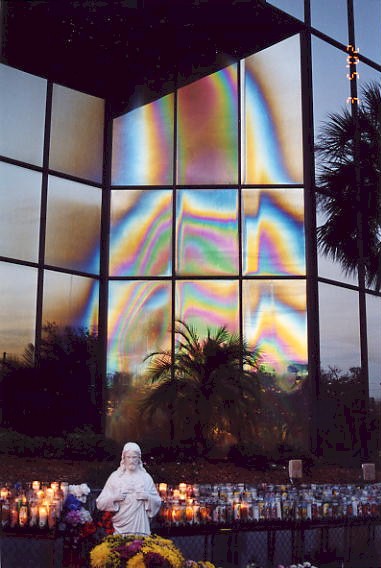

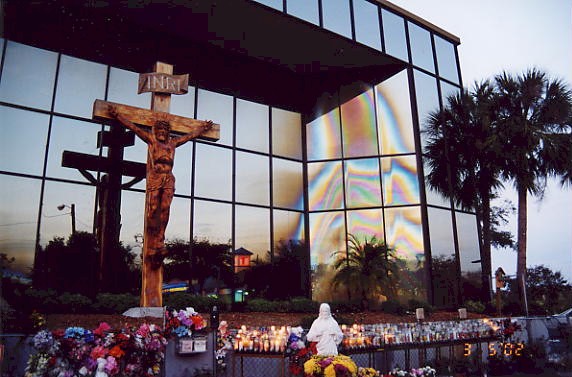
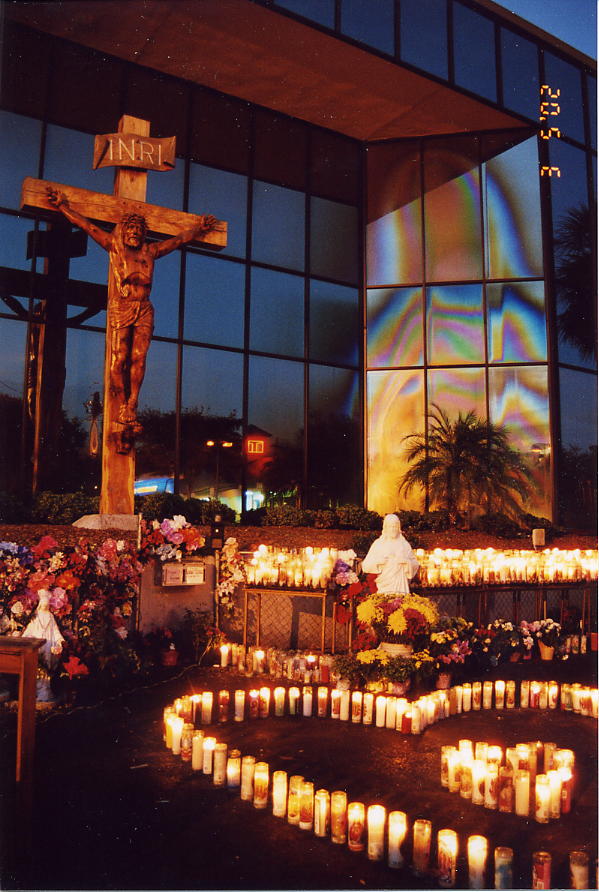

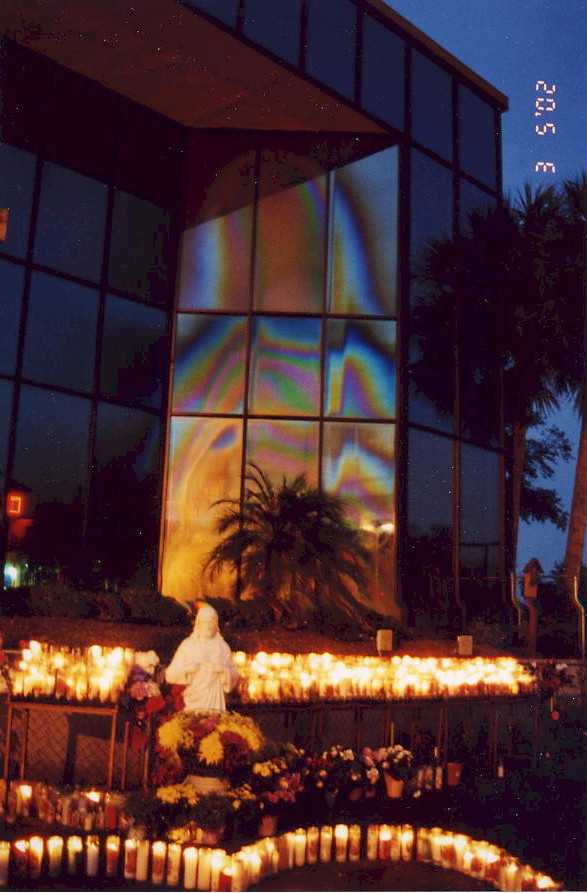
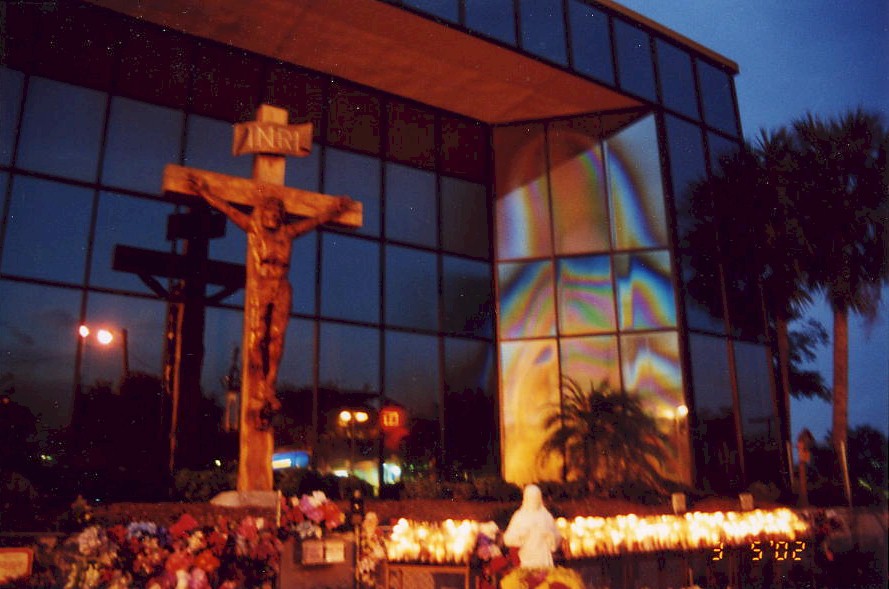
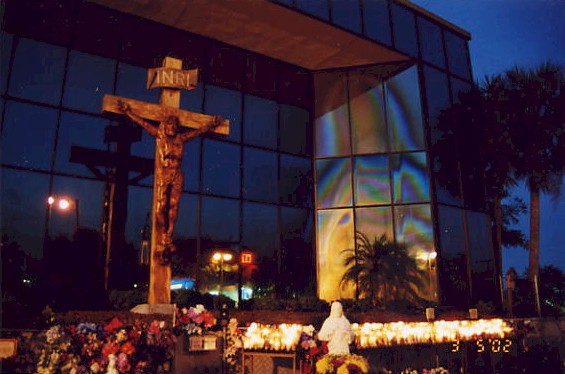
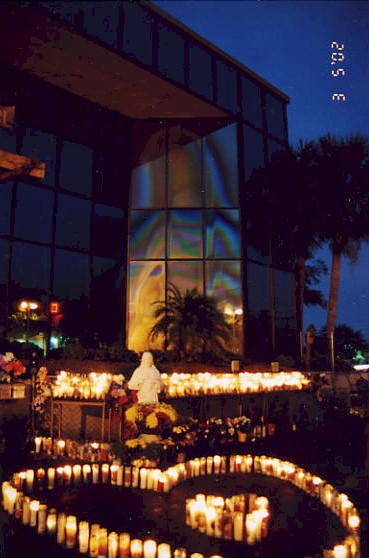
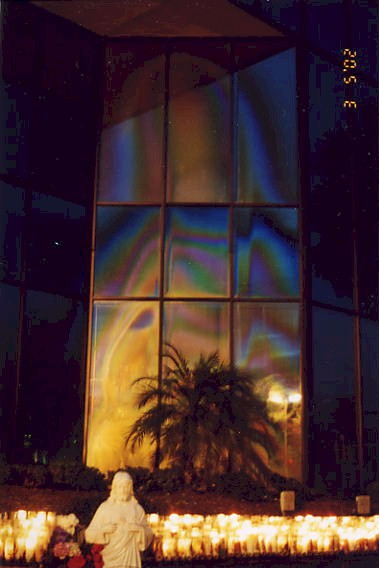
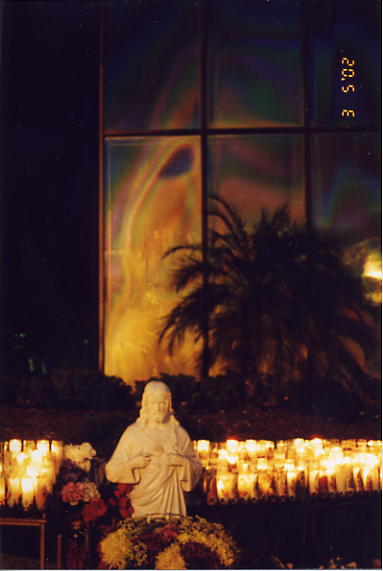
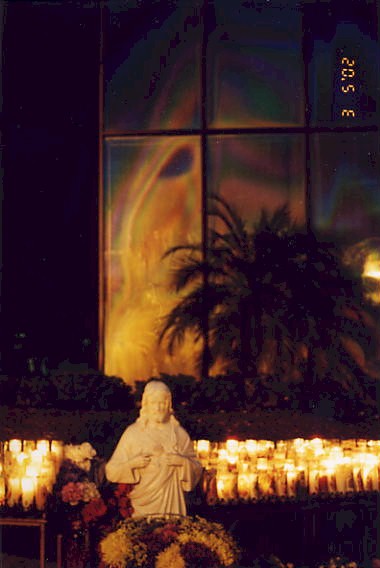
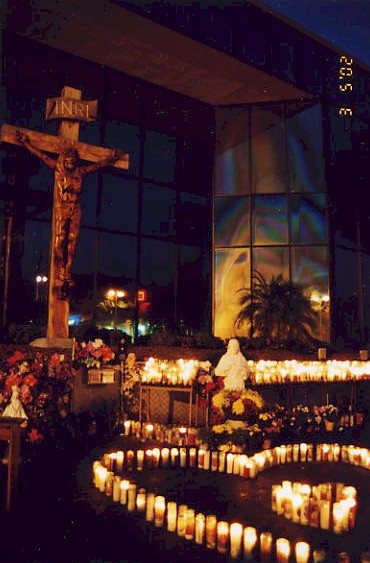
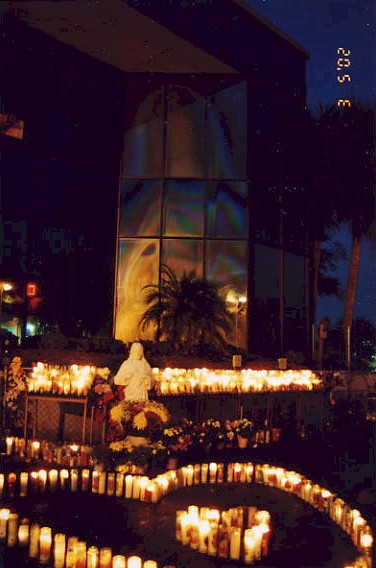
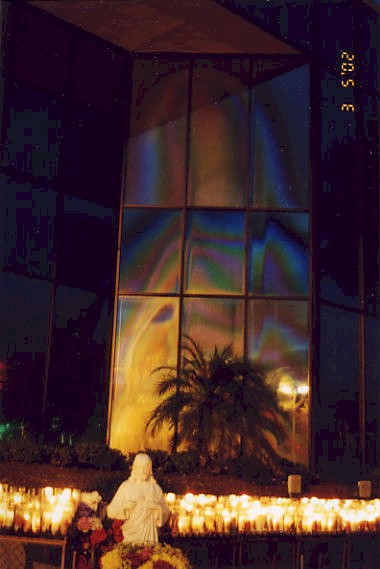
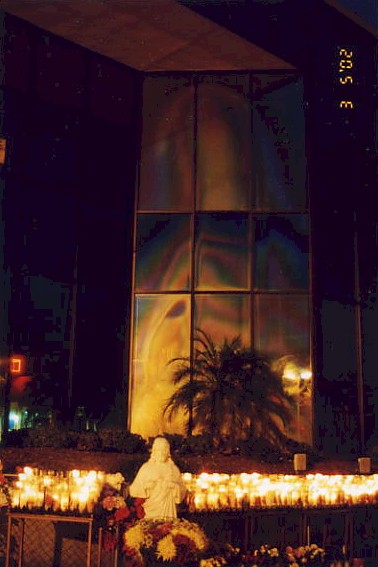
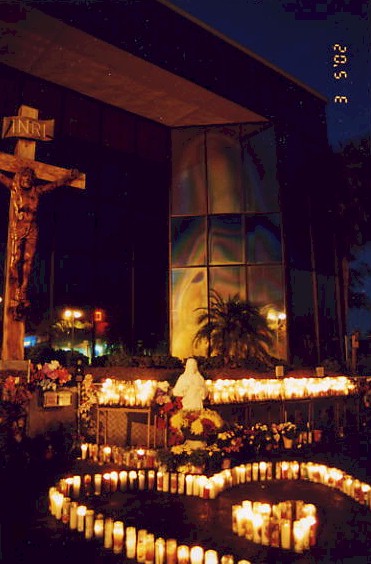
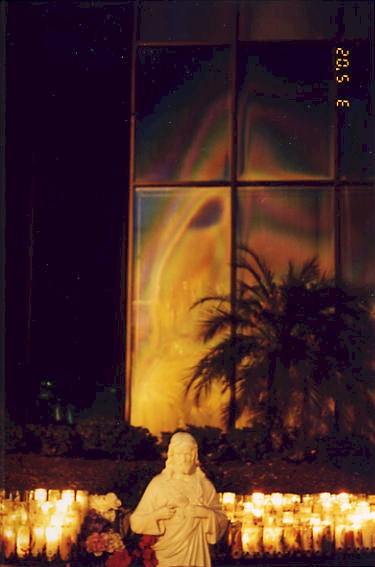
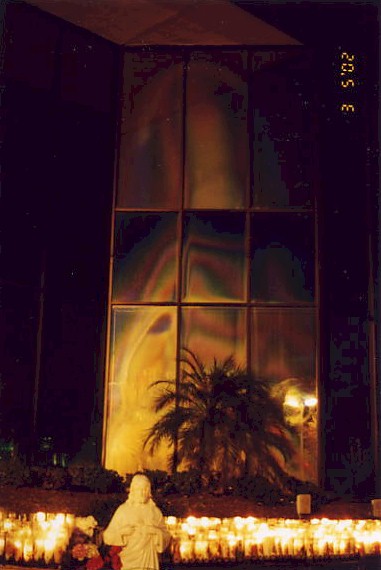
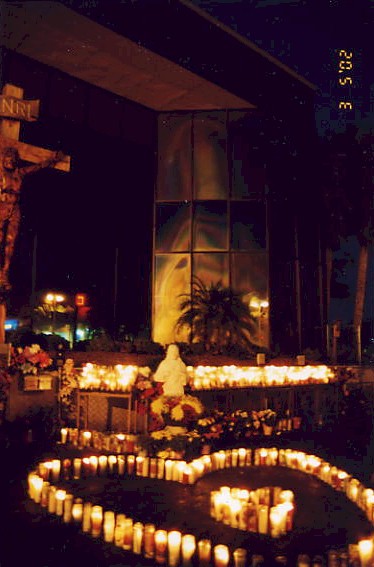
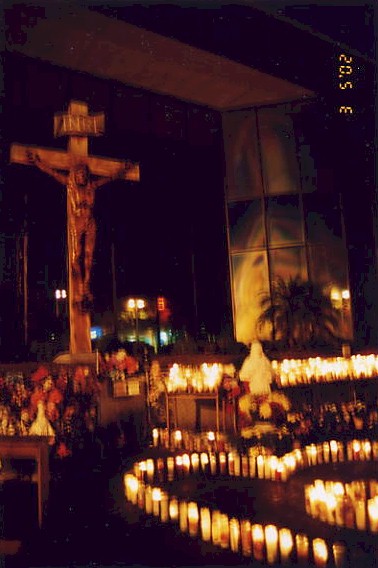
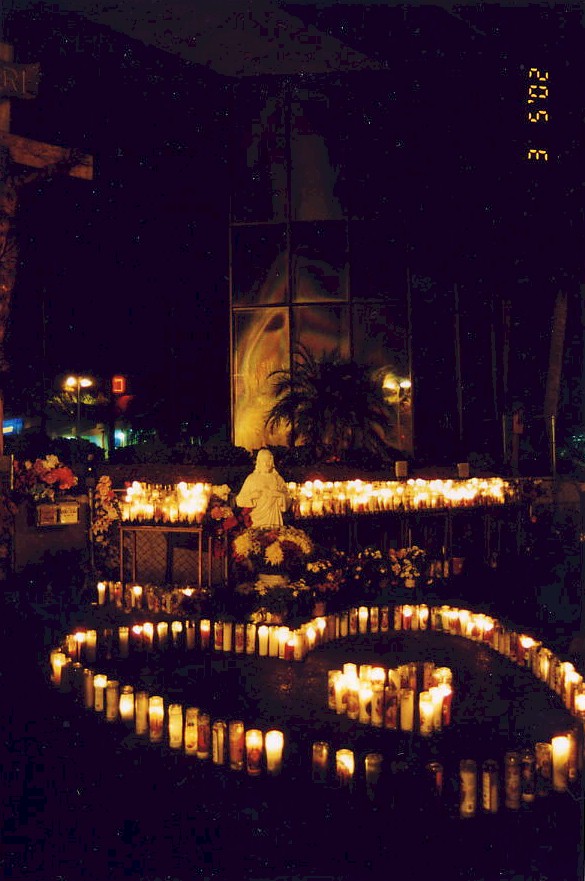
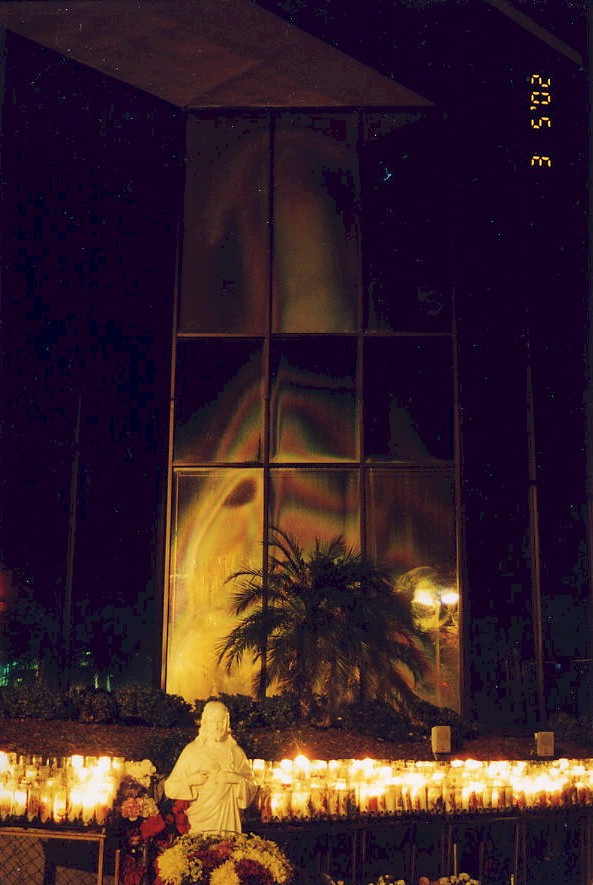
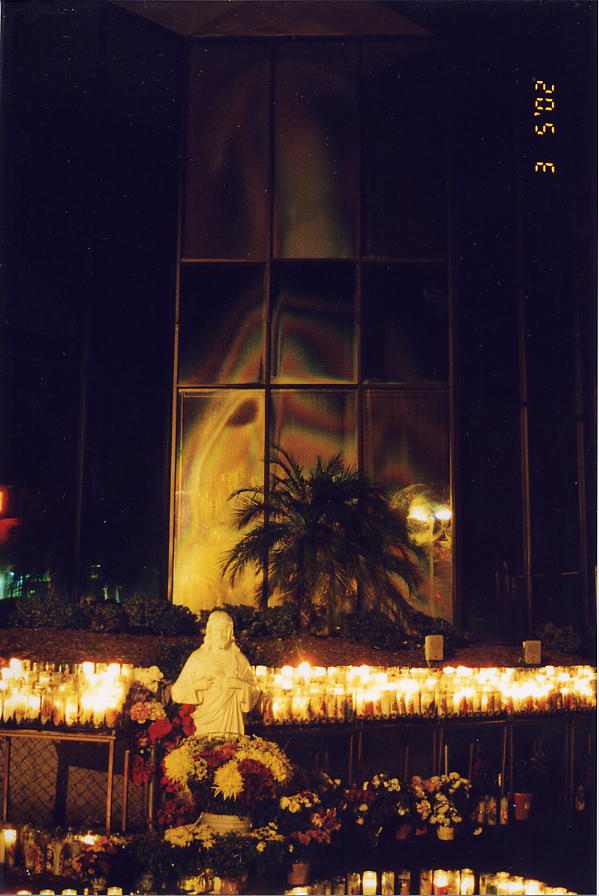
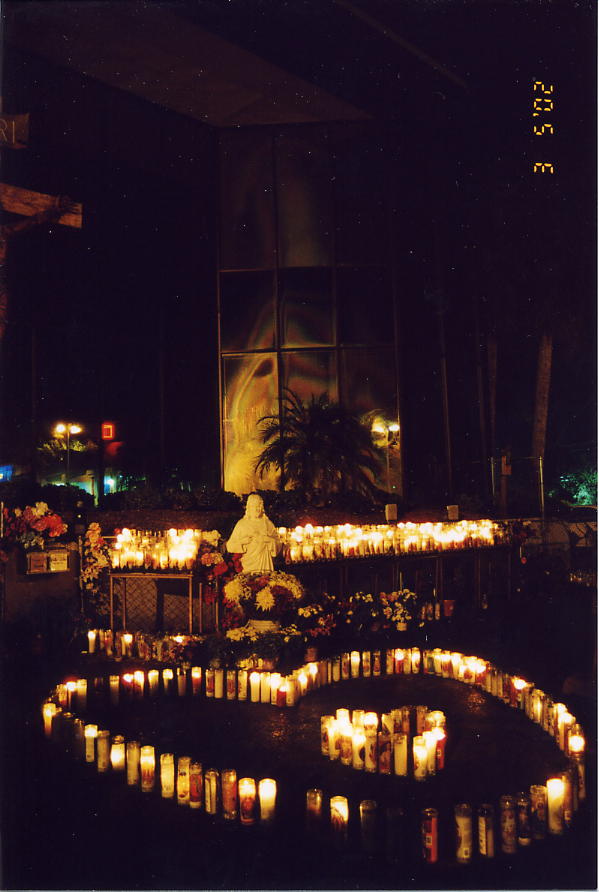
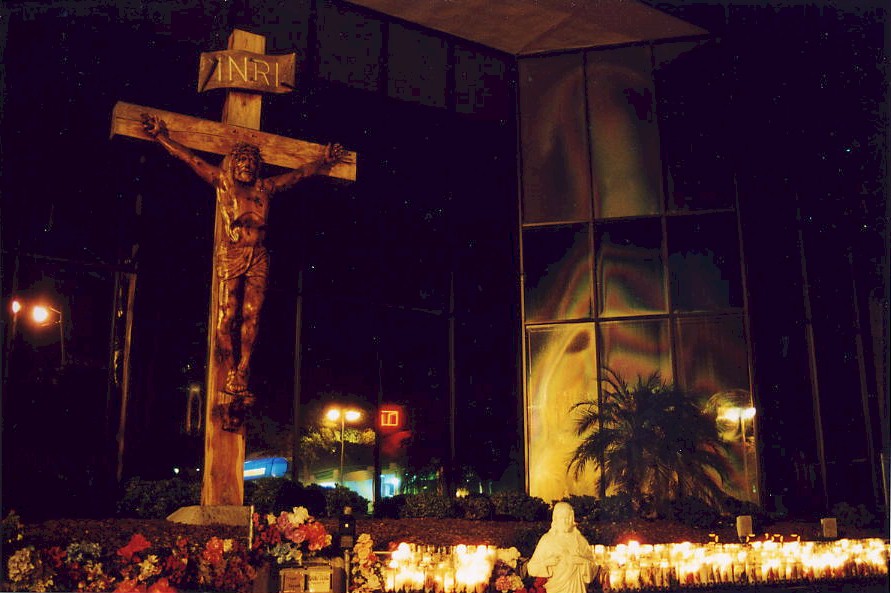
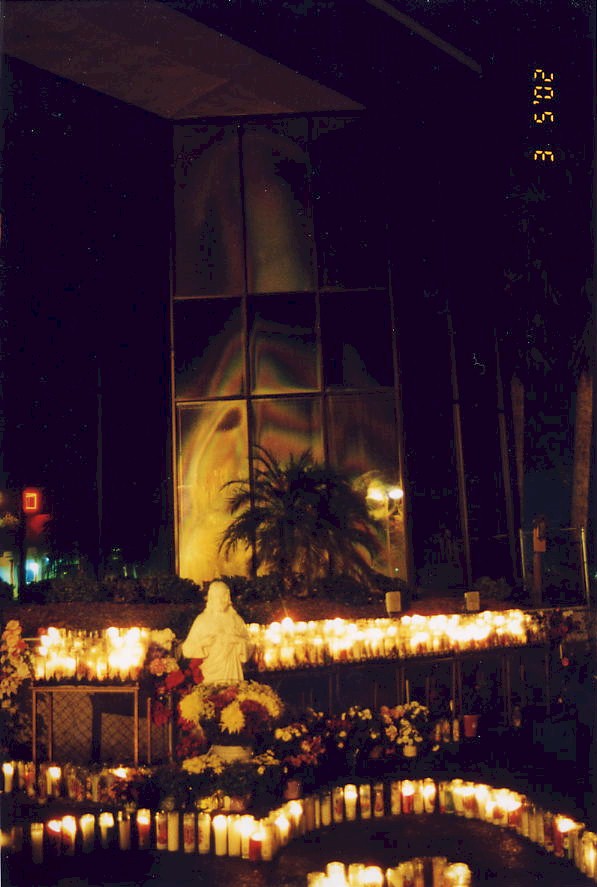
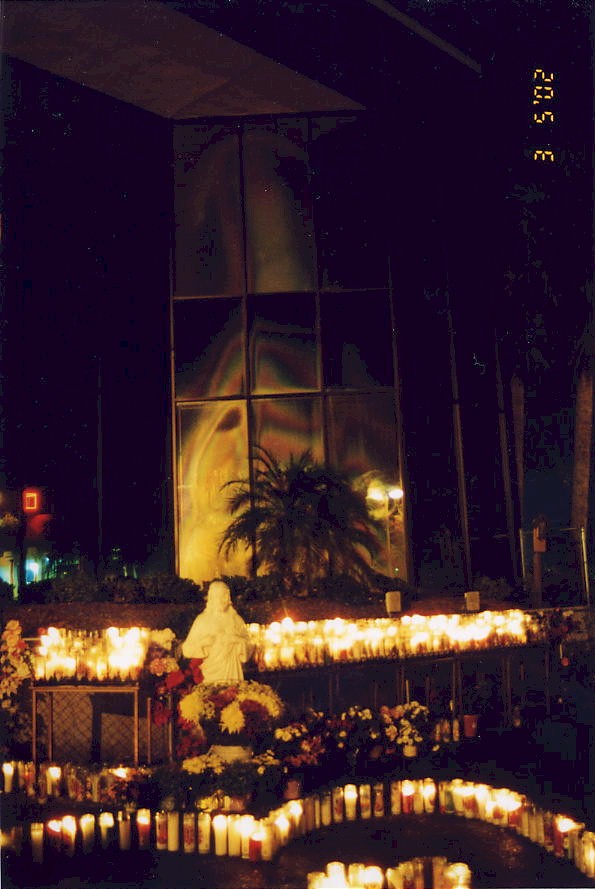
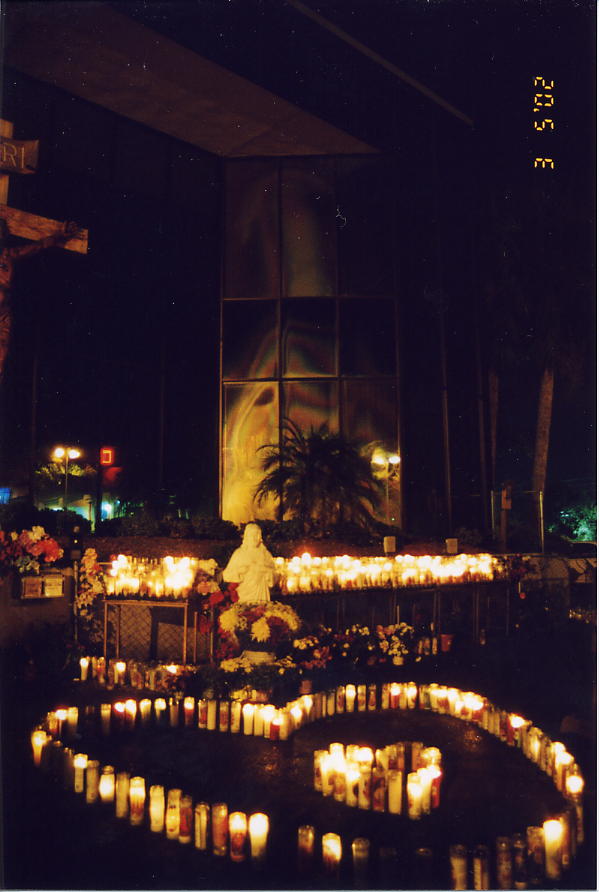
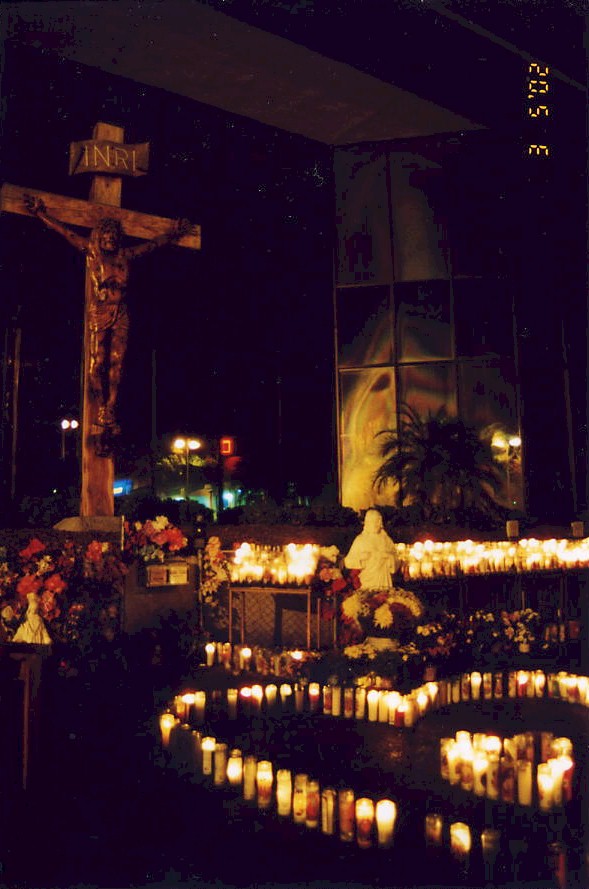
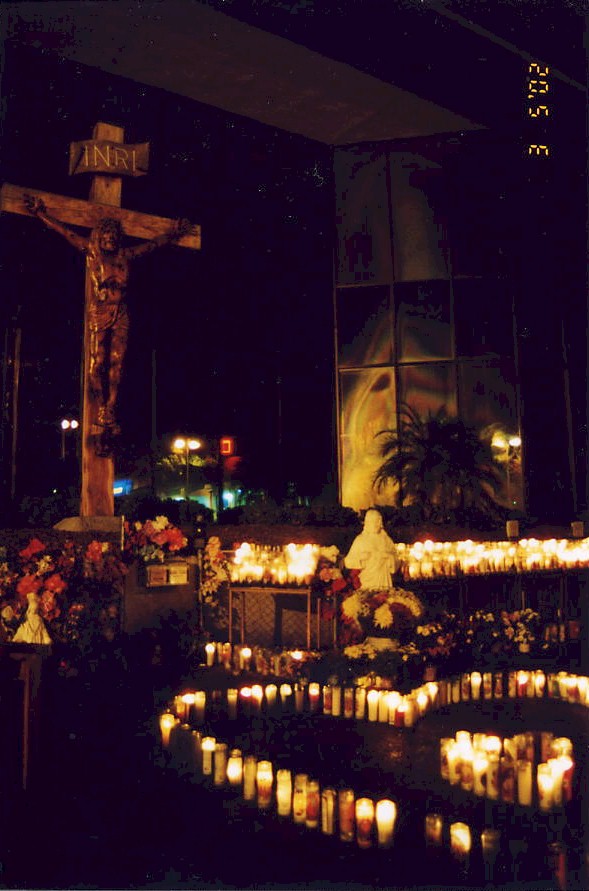
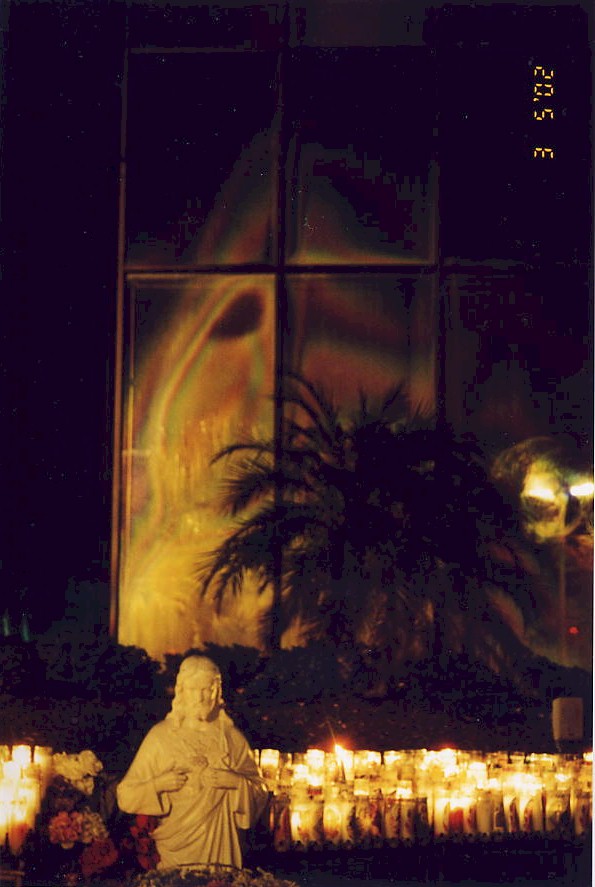
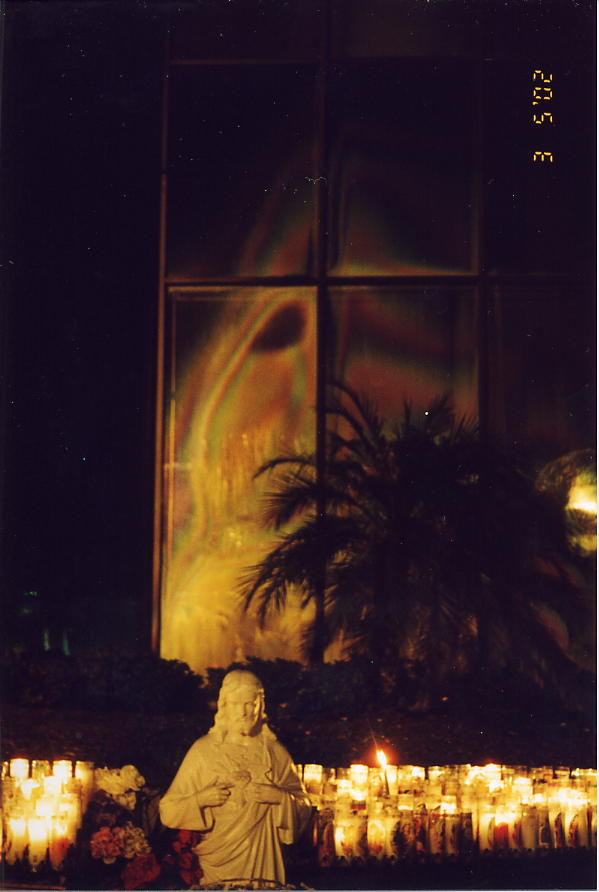
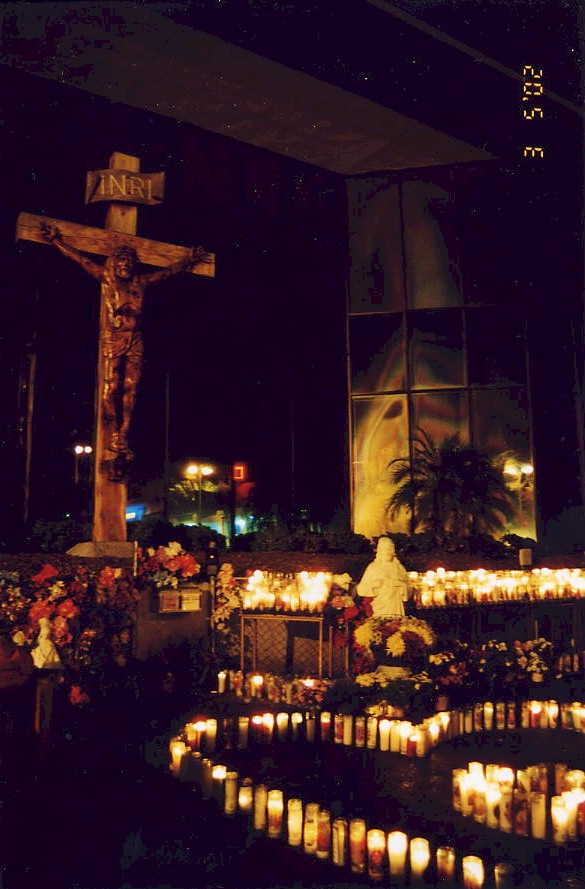
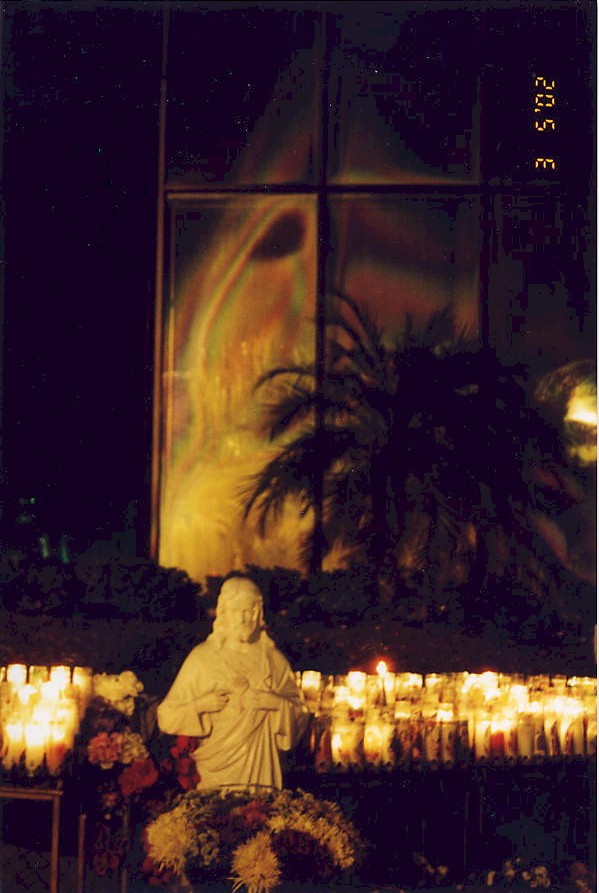

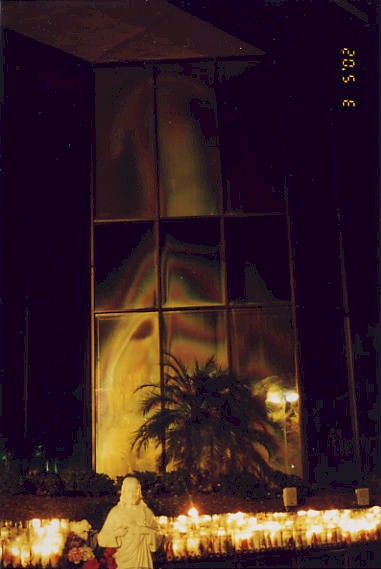
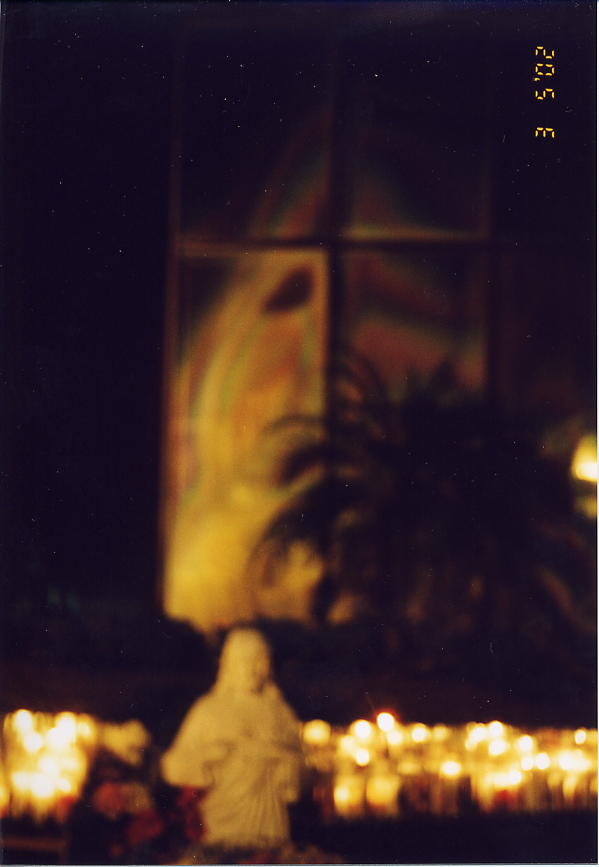
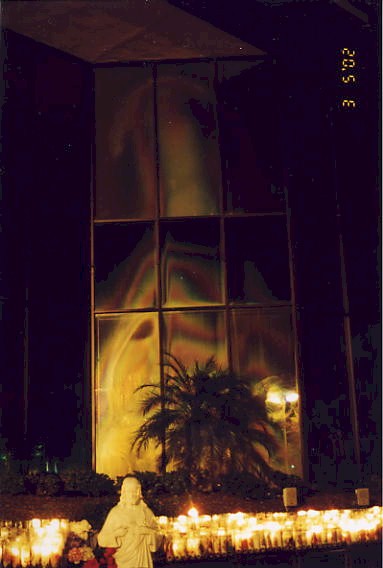
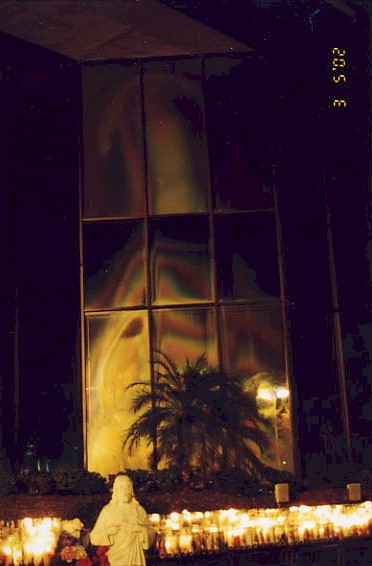
March 15, 2002 message continues
Messenger: The
Shepherds of Christ Movement was born
out of the old seminary.
Fr. Carter went daily to the apparitions
at the old seminary in 1994
for the first four months.
Excerpt from February 15, 2002 message
Jesus speaks: Make
a list of things that are needed so people
can help if they so desire.
Messenger:
A small list is this
1) Priestly Newsletter Book II Foreign Mailing Postage
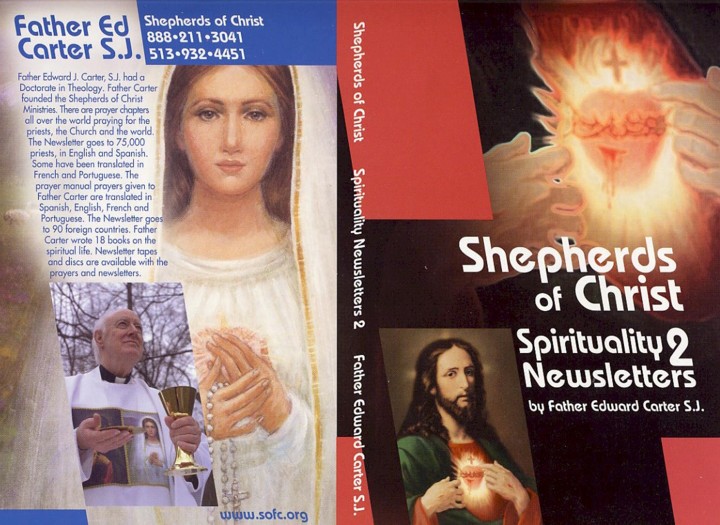
2) Mass Book II
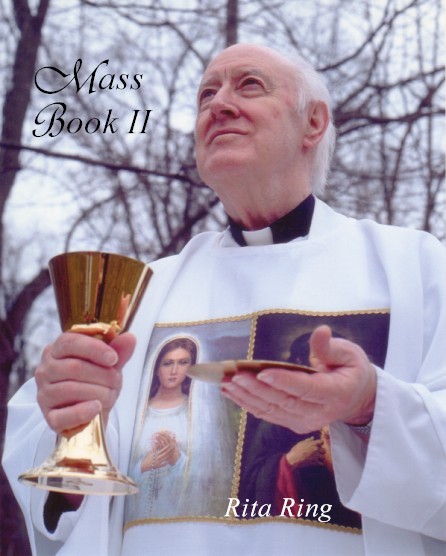
3) Rosary Meditations for Little People and Elderly

4) Blue Book I printing

5) Prayer Manuals printing

6) Holy Spirit Novena Booklet printing

7) Rosary beads

8) Image rosaries to sell

9) Pictures (photo's) to make available

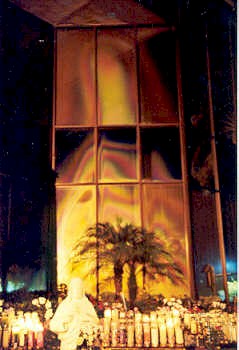
10) Blankets of Mary's image


11) Videos for nursing home program
|
 Mary
talks to the Nursing Homes Mary
talks to the Nursing Homes
Video Session #3
Shepherds of Christ Ministries
P.O. Box 193, Morrow, OH 45152
toll free 1-888-211-3041
fax: 1-513-932-6791
www.sofc.org
Rosary Meditations
received before the exposed Eucharist
(Instruction for Leaders Included)
|
12) Little People's Mass Book
|
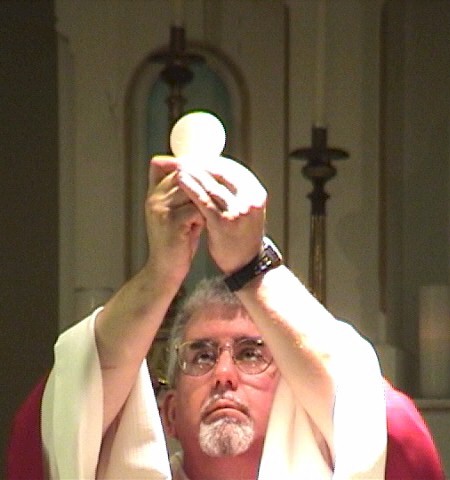
Little People's
Mass Book
|
13) Little People's Coloring Book of the Mass
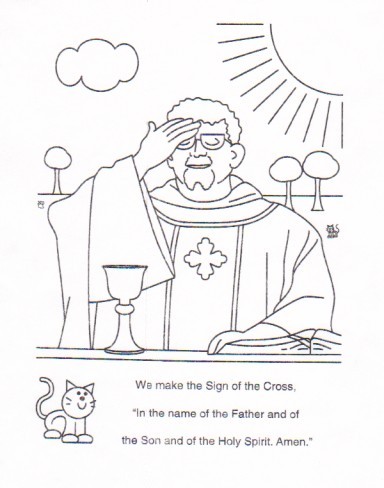
February 15, 2002 message continues
Mary speaks:
I ask you to pray for these needs on the list. Those
who can, can pray hourly.
end of excerpt from February 15, 2002
February 7, 2002
To whom it may concern,
We circulate the Priestly Newsletter that goes to
75,000 priests in the world. This has been circulated since 1994 at the
direction of Fr. Edward Carter, S.J. who had a doctorate in Theology and
taught at Xavier University for over thirty years and author of eighteen
books on the spiritual life and many other various publications.
Our primary purpose is to circulate this Newsletter.
We are now sending three years of Newsletters in a book of 342 pages to
75,000 priests in the United States and 90 foreign countries. A special
Newsletter is enclosed with Father Carter's powerful writing on Grace (2001
issue 1). This writing is also available on tape and on disc.
Our coequal purpose is to circulate prayer manuals
Father Carter compiled for prayer chapters praying for the priests, the
Church and
the world.
All of our printing and postage costs so much money.
We operate from the Virgin Mary building in
Clearwater, Florida, pictures are enclosed. We use the building to spread
materials and rosaries
to encourage people to pray for the priests, the Church and the world.
We also have a church we received from the diocese in
China, Indiana where we distribute our materials and pray before the Blessed
Sacrament hourly and about two hours or more at 6:20 every day. Monthly
adoration before the exposed Eucharist is held for our members for 48 hours
on the 12th of each month to the 14th.
We have a third center in Morrow, Ohio which is our
communication center and mailing address.
We circulate rosaries handmade to Catholic schools all
over the United States and meditation sheets and consecration cards. We try
to send scapulars too when we have them. We supply many beads to our rosary
makers for this.
We had difficulty all last summer securing funds for
beads for our rosary makers. We were not able to send the 100,000 or more
rosaries we usually send in October and May because of funds.
We need $10,000 every month for the loan on the Virgin
Mary building. We pray nightly there usually for about two hours or more at
6:20. We pray all through the day there, hourly, many times before the
image. A big prayer meeting is held on the 5th of the month. Prayers are
prayed for about 4 hours for the priests, the Church and the world. We
broadcast to at least 8 states and all join in the prayers, including Morrow
and China.
We have a nursing home ministry and a prison ministry.
We supply coloring books of the rosary mysteries and the Mass to children.
We desperately need funds for the printing and the
rosary making operation and all the postage. Bishops from foreign countries
beg for rosaries and prayer sheets with the Shepherds of Christ Prayers.
Now we are struggling with the monthly rent on the
building and the postage for the foreign mailing of the Priestly Newsletter
Book II.
We always need money for the rosary beads for the
schools and the Virgin Mary building.
We also do a Holy Spirit Novena, but the little book
has been out of print for some time because of lack of funds. Teachers like
to use it for confirmation. We have prayer chapters using it daily all over
the world.
We want to circulate pictures of the crucifix and
Mary's image on the building, we are unable to do this because of lack of
funds. Enclosed are pictures of the crucifix and the Virgin Mary building.
A very important part of our Movement is trying to get
people to say the Morning Offering. Here is a card we distribute
extensively, especially to Nursing Homes and school children.
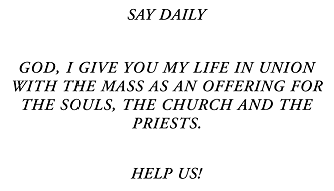
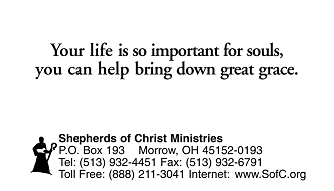
Here is a short form of consecration to the Hearts of
Jesus and Mary that we circulate extensively.

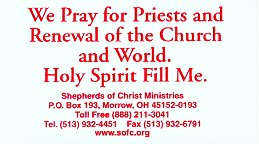
Can you help us. It is a real shame to not even have rent
on the building Mary appears on.
We need to tell the world about the Mass. This is
another important aspect of our ministry. We have so many writings about the
Mass. Mass Book I with the Imprimatur—and all Fr. Carter's
writings and many other writings discerned by Fr Carter before his death.
It is a shame with all the money in the world not to
be able to get the rosary beads to the rosary makers for school children who
want them to pray the rosary.
Our movement is trying to do what Our Lady told us to
do at Fatima for peace in the world.
Can you help us?
Rita Ring
Shepherds of Christ Ministries
Messenger: Jesus wishes that we give
our hearts to Him and Mary.
The following Valentine can be given to Jesus
and Mary any day of the year. It is an act of love that would greatly please
Him.
Use the following Valentine to fill in your
name and the date you gave it to Him.
|
MY VALENTINE FOR JESUS AND
MARY
AND THE WORLD
I _________________
give my heart to
You Jesus and Mary on this day
_________________
I promise to help spread the devotion to
the Hearts of Jesus and Mary.


 |
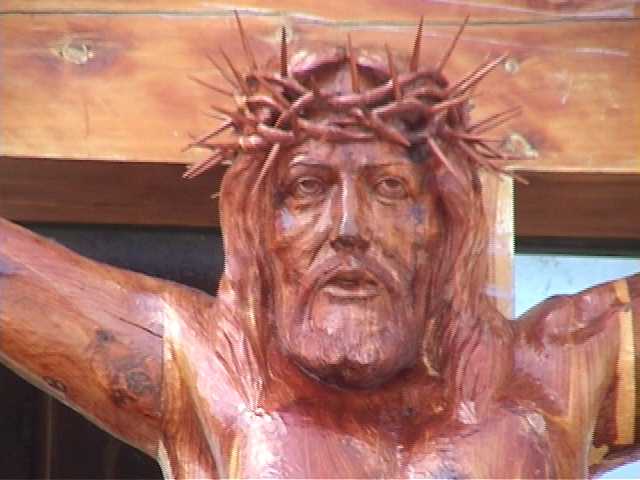
The Story of the
Crucifix Video
If you have a good dialup connection, you should be able
to watch the movie live.
Click Here for help with Videos
 click
here to download The Story of the Crucifix video
click
here to download The Story of the Crucifix video
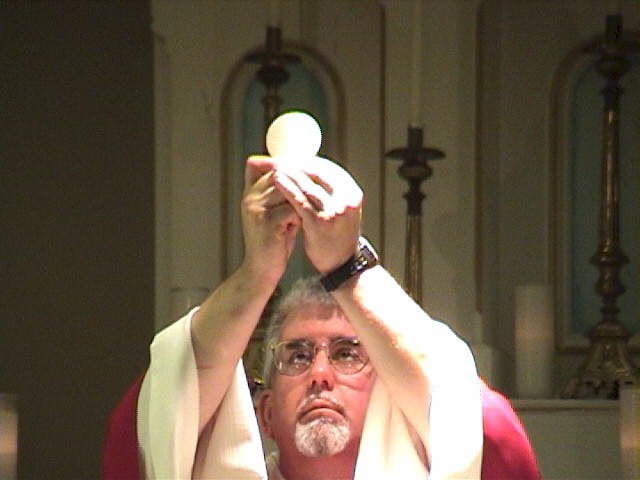
Nursing Home Mass
Video
We updated the Nursing videos so that if you have a good
dialup
connection, you should be able to watch the movie live.
Click
Here for help with Videos
 click
here to download the Nursing Home and Homebound Mass video (12.3 MB)
click
here to download the Nursing Home and Homebound Mass video (12.3 MB)
This cannot be altered in anyway.

 PDF file of Advertisement #1
PDF file of Advertisement #1
Please allow a couple of
minutes to download, thank you.
Messenger: A shorter ad may be as follows.
This cannot be altered in anyway.

 PDF file of Advertisement #2
PDF file of Advertisement #2
This cannot be altered in anyway.

 PDF file of Advertisement #3
PDF file of Advertisement #3
Table of
Contents
Previous
Daily Message
Main Shepherds of
Christ Page
 Copyright
© 2002 Shepherds of Christ.
Copyright
© 2002 Shepherds of Christ.
Rights for non-commercial reproduction granted:
May be copied in its entirety, but neither re-typed nor edited.
Translations are welcome but they must be reviewed for moral and
theological accuracy by a source approved by Shepherds of Christ Ministries
before any distribution takes place. Please contact us for more information.
All scripture quotes are from the New Jerusalem Bible, July 1990, published by
Doubleday.
Revised: March 15, 2002
URL: http://www.SofC.org
Contact Information for Shepherds of Christ
Email: info@SofC.org
Shepherds of Christ
Ministries
PO Box 193
Morrow, Ohio 45152-0193
Telephone: (toll free) 1-888-211-3041 or (513) 932-4451
FAX: (513) 932-6791
















 May
13, 1993
May
13, 1993 































































 Mary
talks to the Nursing Homes
Mary
talks to the Nursing Homes












